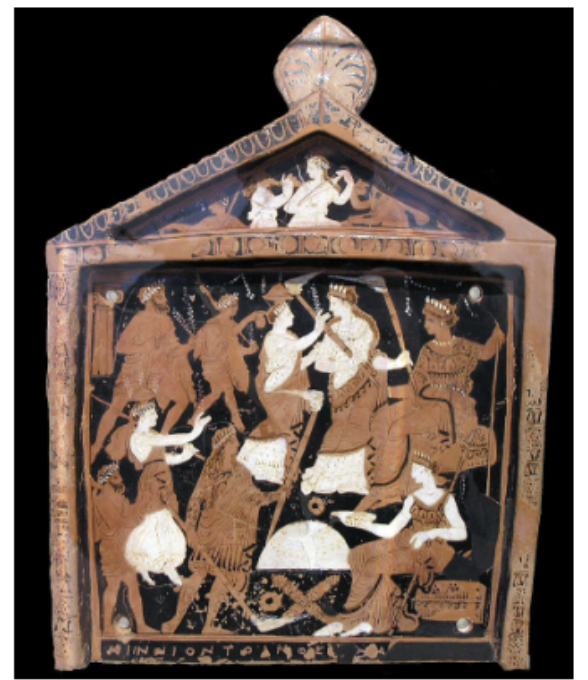Classics Midterm
1/76
There's no tags or description
Looks like no tags are added yet.
Name | Mastery | Learn | Test | Matching | Spaced | Call with Kai |
|---|
No analytics yet
Send a link to your students to track their progress
77 Terms
Cycladic Harp-Player, 2700 BCE from the cycladic islands
This statue emphasises the peace-like non-war-like ideology that Evans placed upon the Minoans.
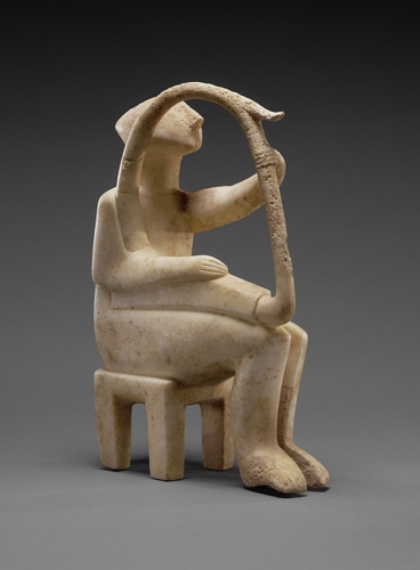
The Franchthi Cave 18000BCE Southern Peloponnese
From the paleolithic and neolithic communities
this cave there were found remains of a tribe that used to occupy the space of 15,000 years (small animal bones), including evidence of pottery workshop which serves as evidence of trade and obsidian from Mil( island 100 miles away by sea)which suggests the cave being integrated in the trading network.
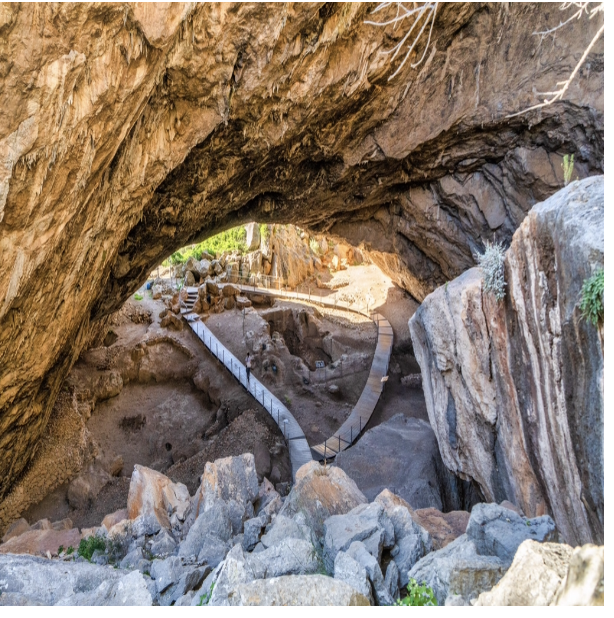
The Franchthi Cave 18000BCE Southern Peloponnese
this cave there were found remains of a tribe that used to occupy the space of 15,000 years (small animal bones), including evidence of pottery workshop which serves as evidence of trade and obsidian from Mil( island 100 miles away by sea)which suggests the cave being integrated in the trading network.
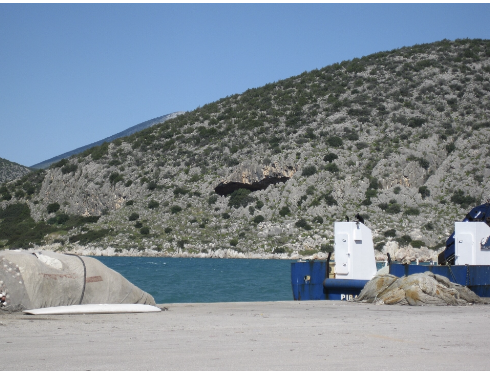
neolithic Demini 3300BCE
a mildly fortified town and in the center a slightly bigger house- speaks of a community that is starting to organize itself.
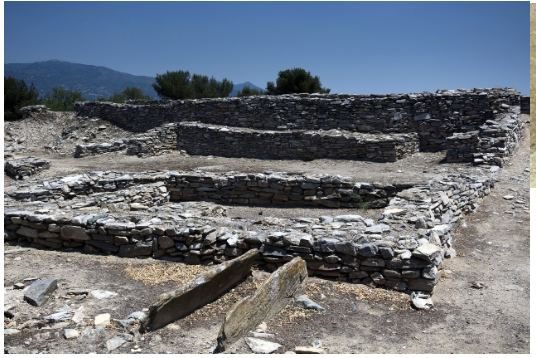
Pottery from the neolithic Demini 3300BCE
This portrays evidence of trade due to distinct pottery style (Abstract shapes). Different styles and techniques reflect a trade of ideas and processes between diff people (geometric, swirls)
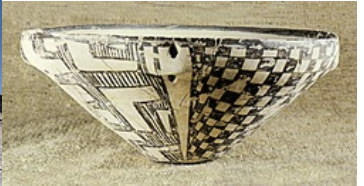
Pottery from the neolithic Demini 3300BCE
This portrays evidence of trade due to distinct pottery style (Abstract shapes). Different styles and techniques reflect a trade of ideas and processes between diff people (geometric, swirls)
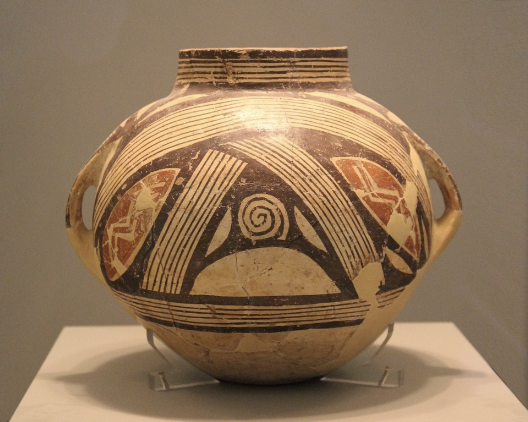
Pottery from the neolithic Demini 3300BCE
This portrays evidence of trade due to distinct pottery style (Abstract shapes). Different styles and techniques reflect a trade of ideas and processes between diff people (geometric, swirls)
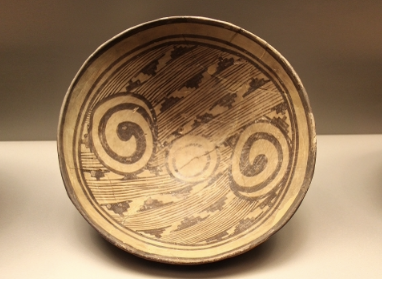
Artifacts found inside the early helladic cemetary Tsepi 2000 BCE
Represents signs of community organization due center of cemetery and grave goods being deposited which represents community identity, prestige of the past and social Excess. (there's fryer pans, early human figure shape)
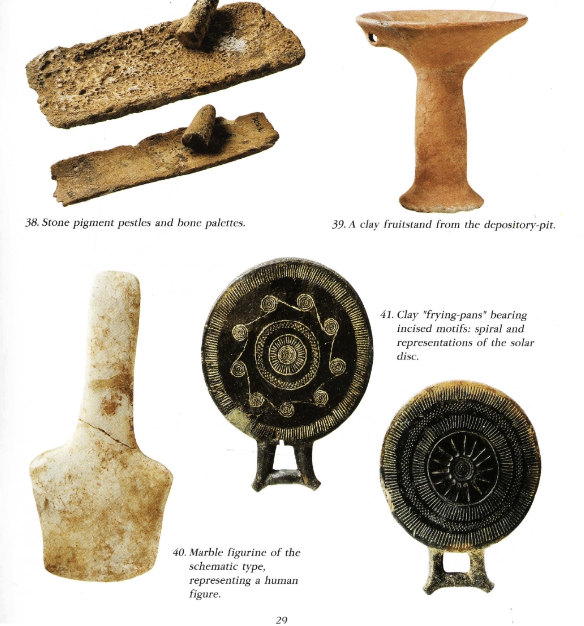
The early Helladic Cemetery Tsepi 2000BCE
Represents signs of community organization due center of cemetery and grave goods being deposited which represents community identity, prestige of the past and social Excess. (there's fryer pans, early human figure shape)
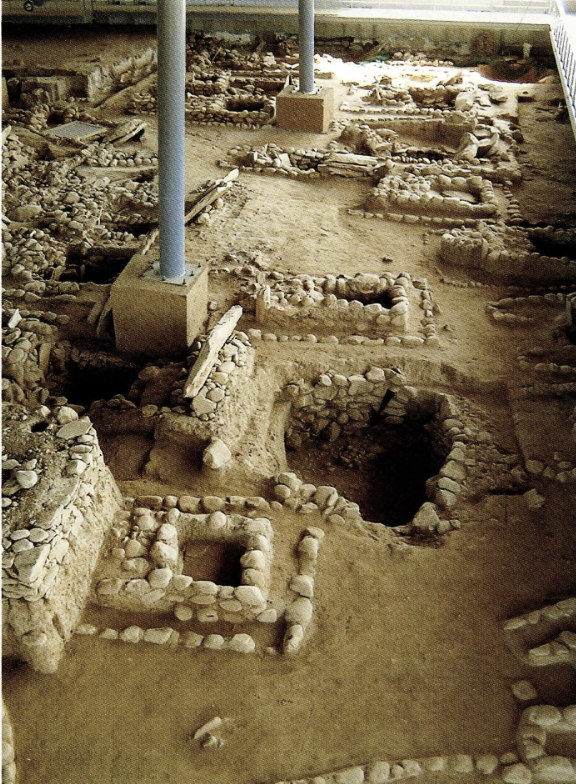
Rekhmire Tomb in Egypt 1400BCE
This represents a form of submission to the powerful king as people round the world come to give offerings to the Egyptian king. The guys depicted are Cretans to achieve involvement in Egyptian power.
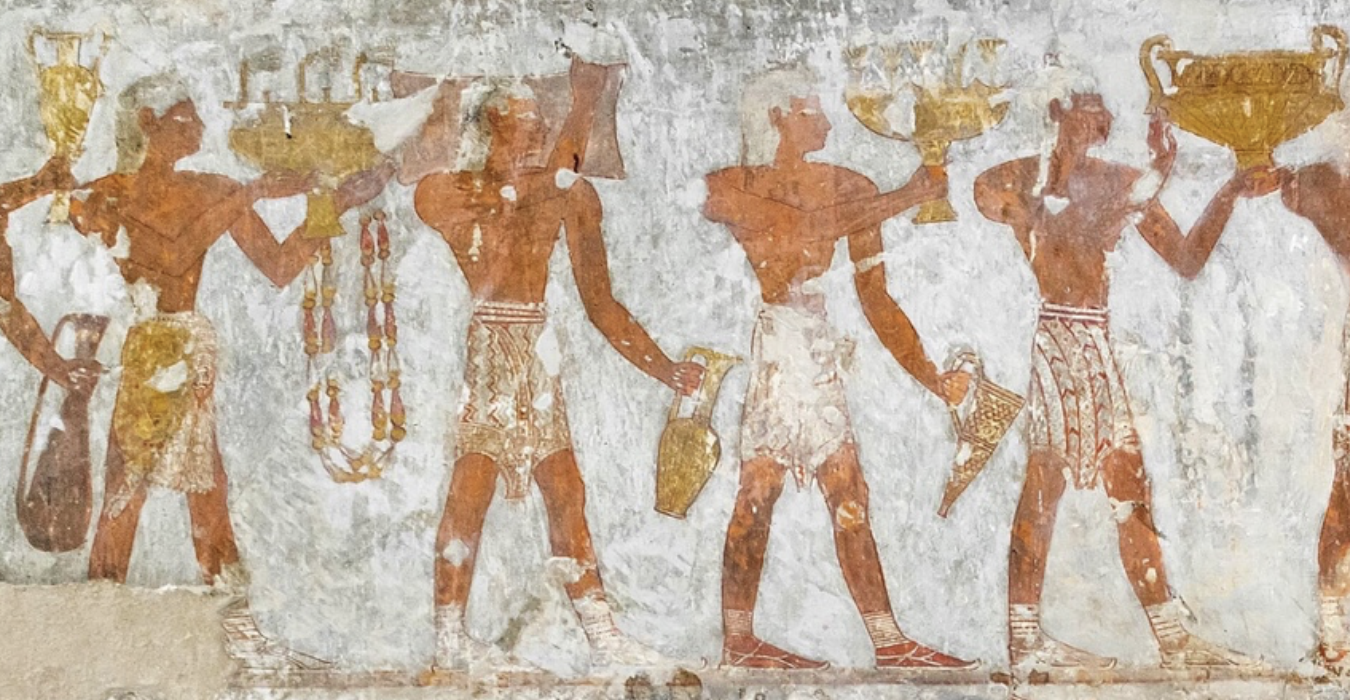
Cycladic figure, Naxos, Plastris Type, 2800BCE
Cyclaid Figurines groups from where they are found and by stylistic changes. They are all female as Cretan culture placed special significance on female figurines- part of enigmatic culture. They speak of an existence of Cycladic, Minoan or Cretan culture
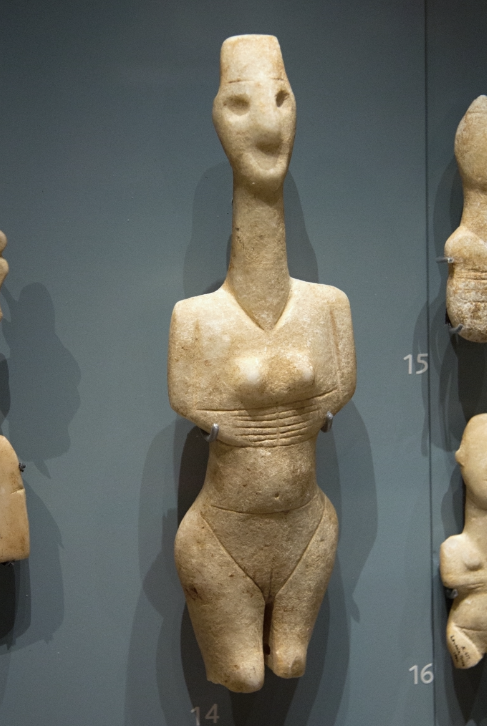
Cycladic Figure, Spedos type, 2500 BCE
Cyclaid Figurines groups from where they are found and by stylistic changes. They are all female as Cretan culture placed special significance on female figurines- part of enigmatic culture. They speak of an existence of Cycladic, Minoan or Cretan culture
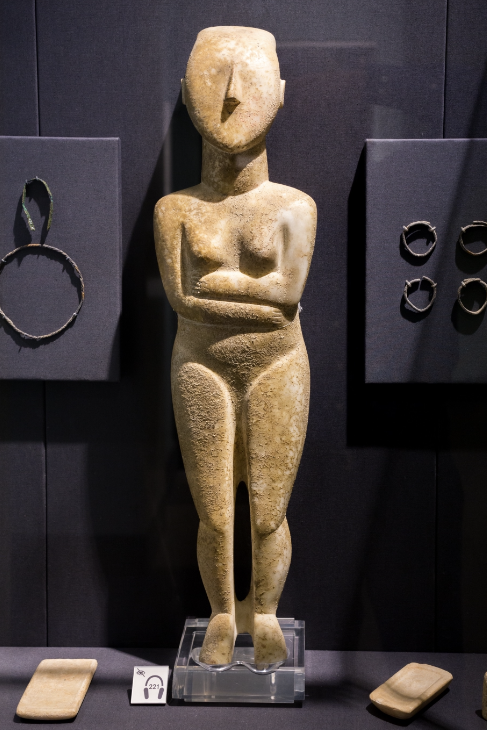
Cycladic Figure, Crete, Koumasa Type, 2200BCE
Cyclaid Figurines groups from where they are found and by stylistic changes. They are all female as Cretan culture placed special significance on female figurines- part of enigmatic culture. They speak of an existence of Cycladic, Minoan or Cretan culture
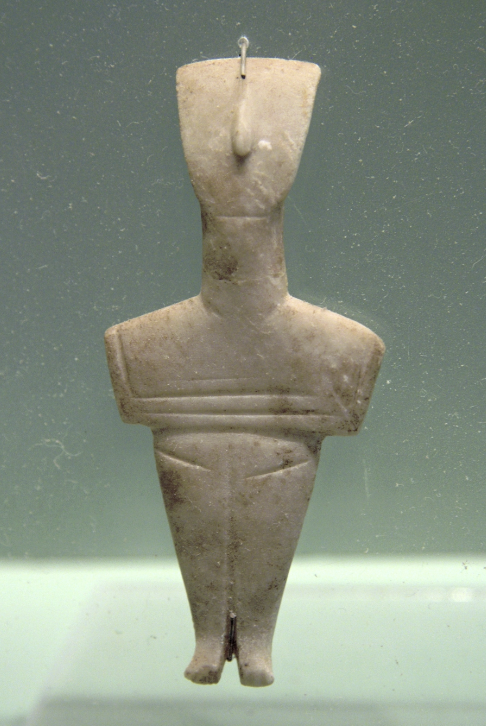
Harvester Vase, Hagia Triada, 1500BCE
Shows harvesters bringing their grain- a ritual procession where local people had to bring this vase a certain percentage of their harvest was brought then redistributed in times of drought
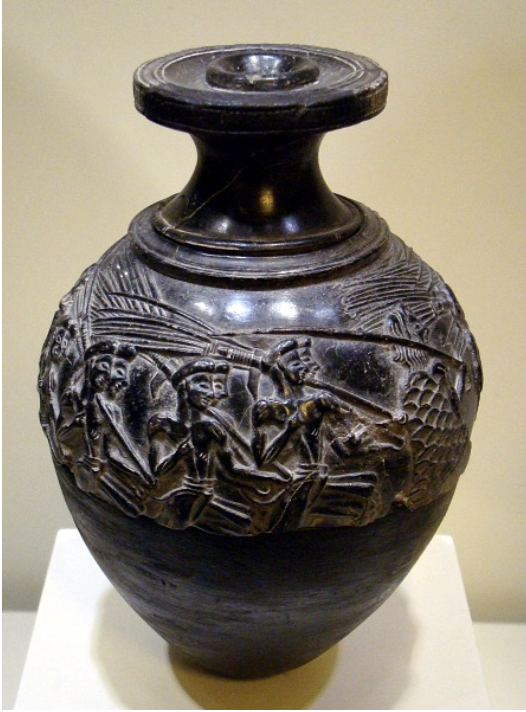
Kings throne at knossos, restored by Emile gillieron and piet de jong
There is a portrayal of 2 griffins on each side which are mythical animals (part eagle, part lion). Shows how there may have been a central individual in power duringthe time that the people worshiped or looked up too because of the placement of the chair in the room
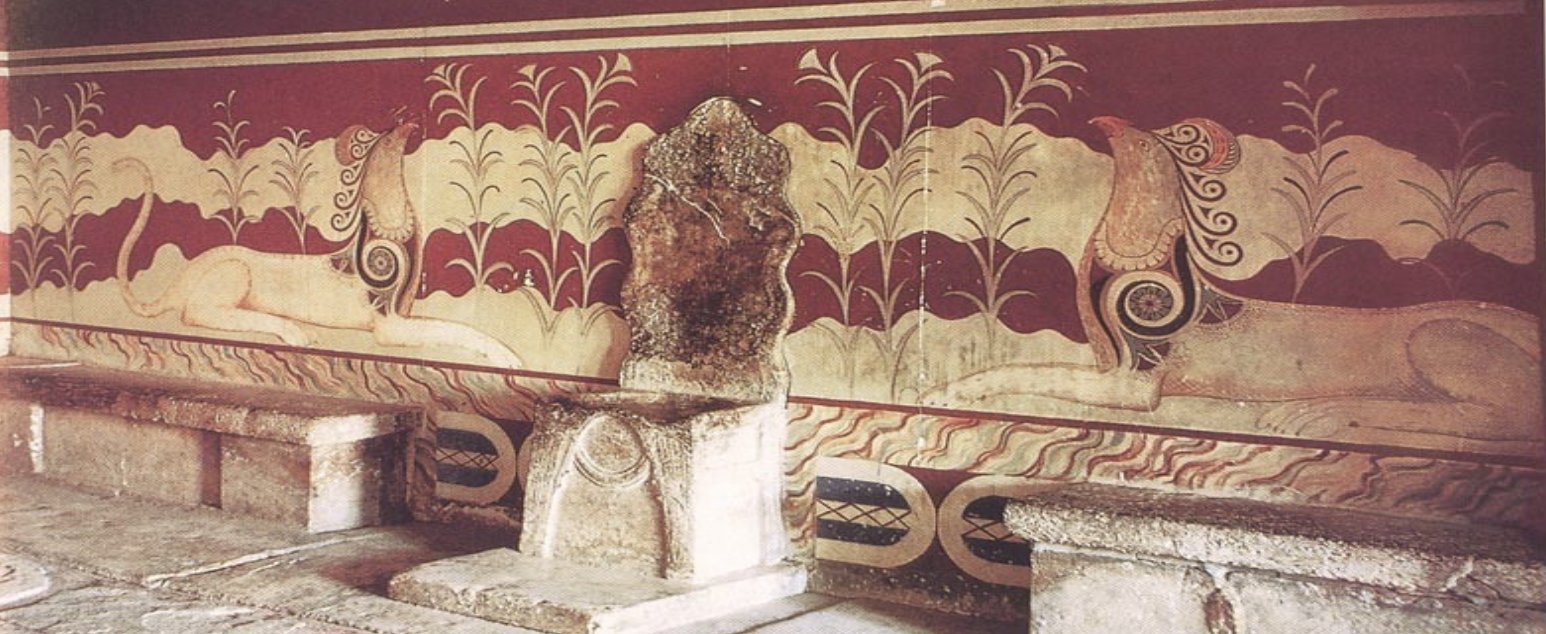
Fresco of Dolphins, Knossos, restored by emile gillieron and piet de jong
through scenes of nature Evan thought Minoans were peaceful and considered them the peaceful counterpart to the Mycenaean
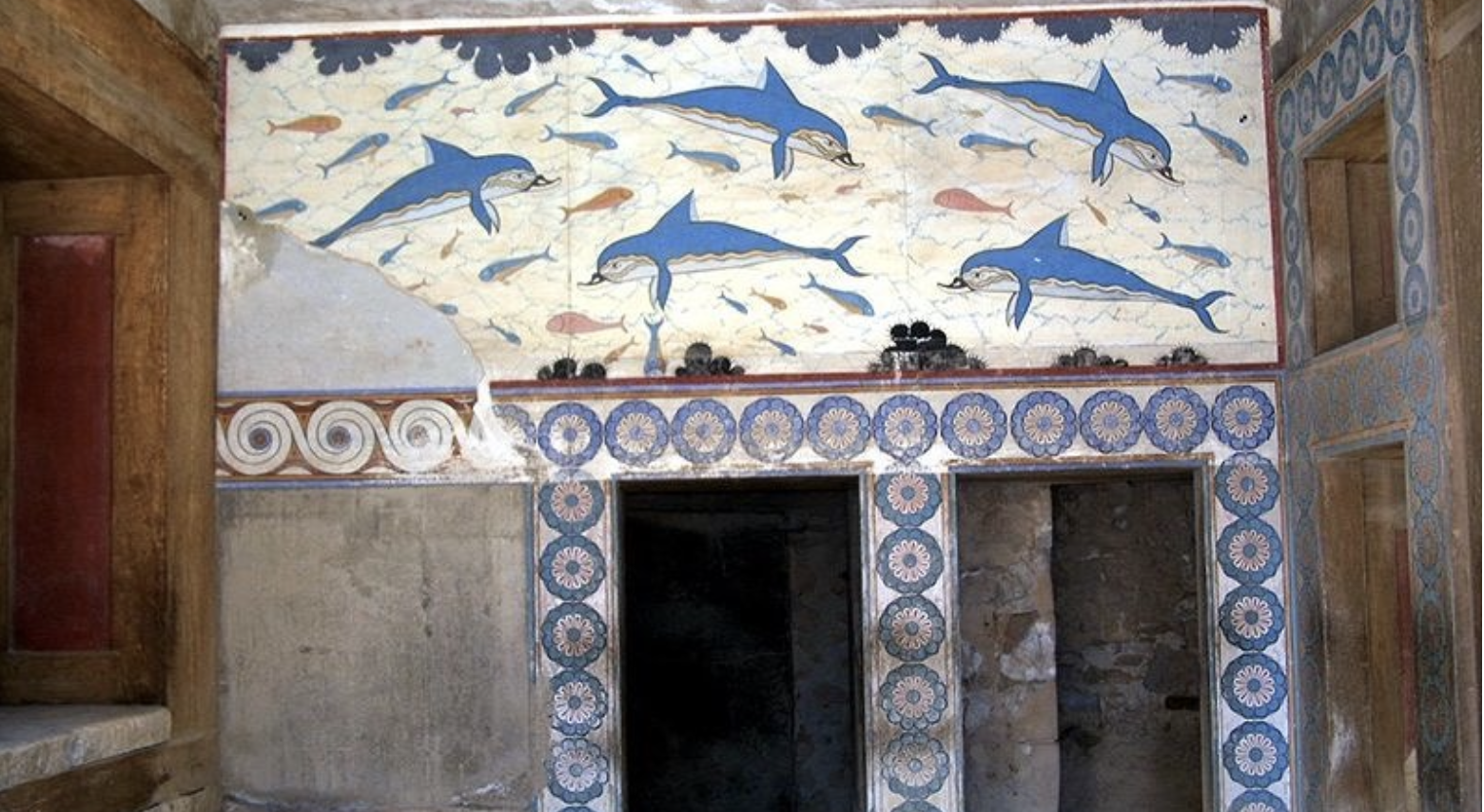
Snake Goddess, Crete, 1600 BCE
Minoan Religion Unknown what the Minoan religion is about, it could be possible the depiction of women could be fertility, snakes represent power and rebirth, possible underworld.
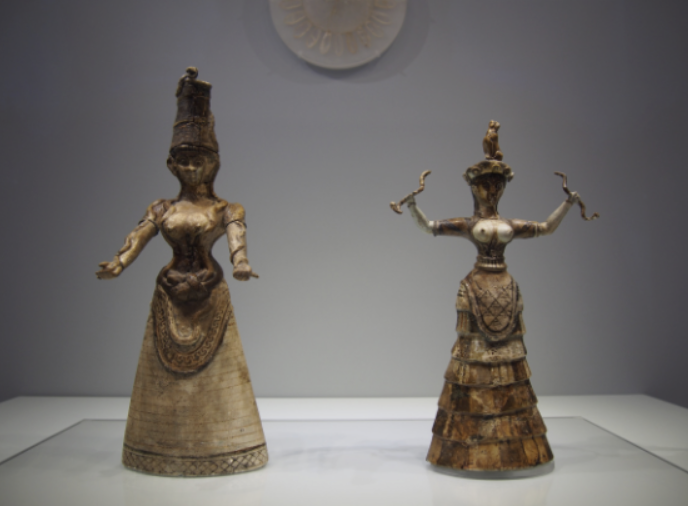
Gold Signent Ring, Knossos 1450 BCE
Minoan religion Unknown what the Minoan religion is about, theres depiction of female socratily is central in their earlier figures.(in this case there's the snake goddess with women worshipers)
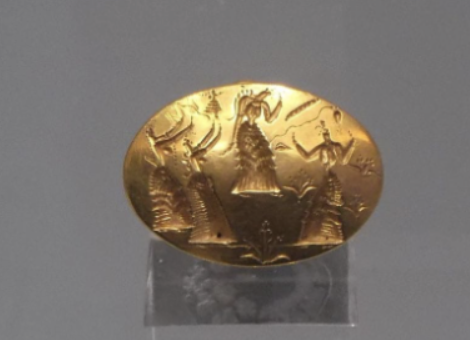
Bull Leaping Fresco, Knossos
Establishes the importance of bull leaping to the people in crete and how it showed a significance of culture as well as trade of traditions through greece.
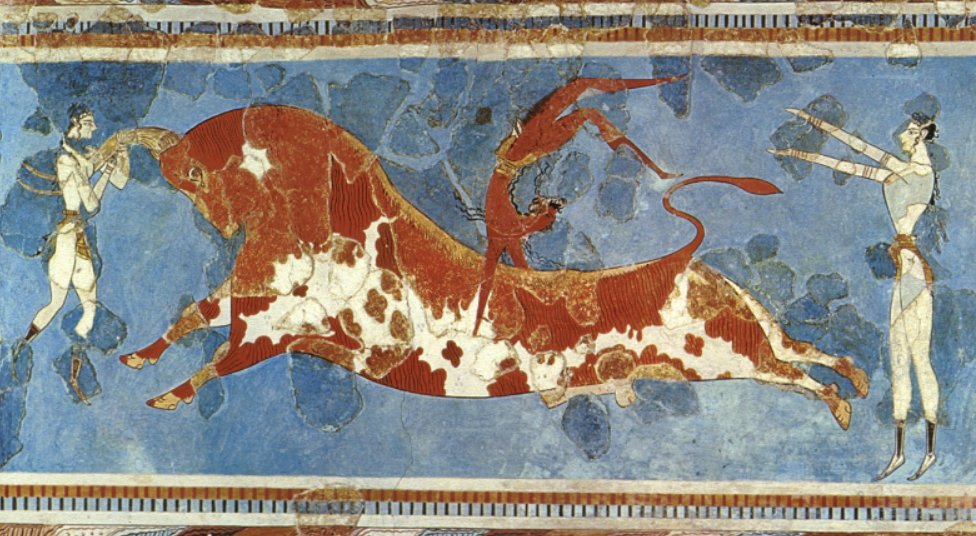
minoan bull leaper, bronze, knossos, 1400BCE
Establishes the importance of bull leaping to the people in crete and how it showed a significance of culture as well as trade of traditions through greece.
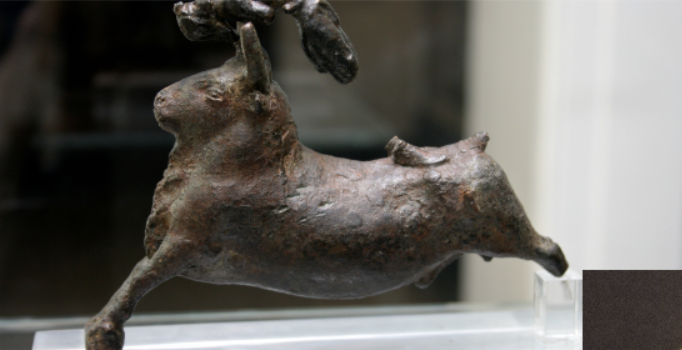
Gold ring with Minoan bull leaper, 1375BCE, Knossos
leaping person over bull,Establishes the importance of bull leaping to the people in crete and how it showed a significance of culture as well as trade of traditions through greece.
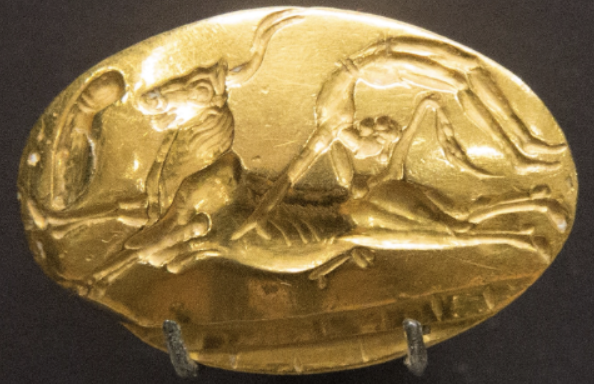
grandstand Fresco, knossos, 1500BCE
Speak to a central function through the display of bull leaping of an audience depicted in the fresco. It's a public performance and display with important meaning showing it could have had some type of religious or cultural importance that brought people together
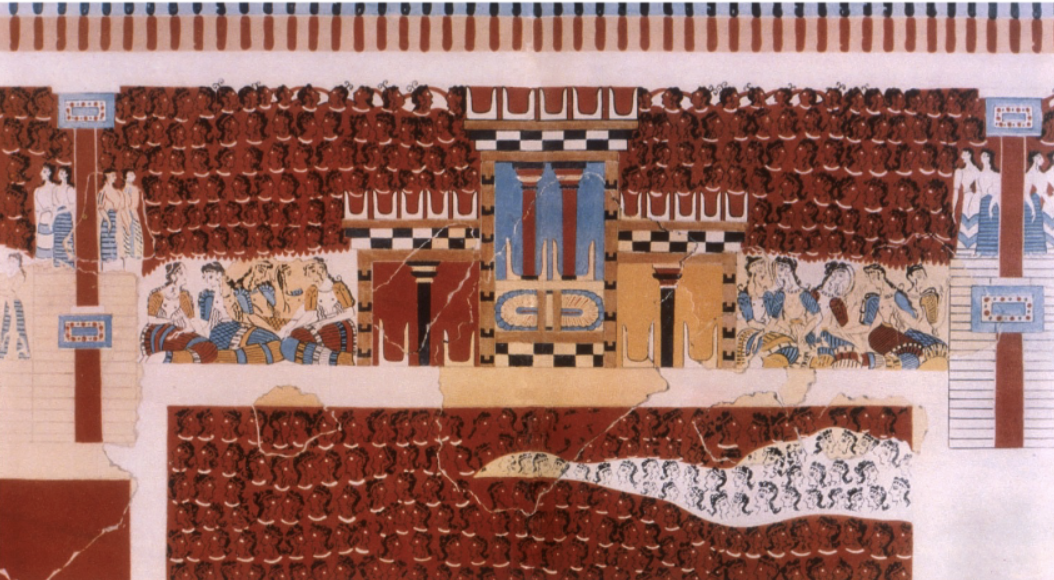
Hagia Triada Sarcophagus, 1400 BCE
More evidence of the ritual function of the bull, we see the bull strapped on the table : Egyptian style fresco. Again emphasis on the significance of bull, represents some power, communal act and gift to the dead
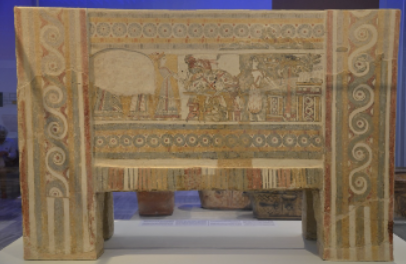
Hagia Triada Sarcophagus, 1400 BCE
More evidence of the ritual function of the bull, we see the bull strapped on the table : Egyptian style fresco. Again emphasis on the significance of bull, represents some power, communal act and gift to the dead

Mask of Agamemnon, Gold, Mycenae, 1500BCE
Shliman found the gold mask in Mycenea and sent a letter to the ruler of the Ottomans of the time, probably not face of Agamemnon but the interpretation painted a picture .
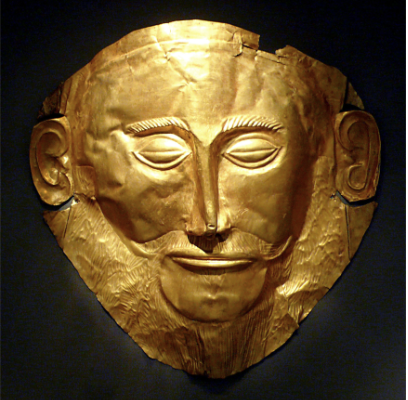
Spring Fresco, Akrotiri, 1650 BCE
Minoan Fresco with the dance of the swallows that seems peaceful and harmonious
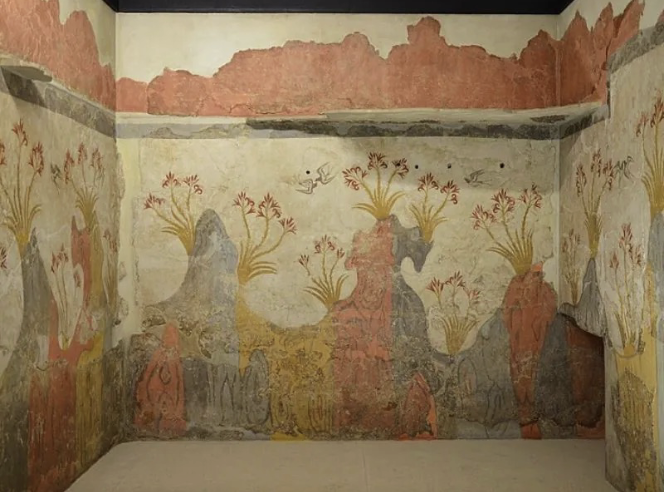
Flotilla Fresco, from akrotiri, 1650 BCE
Another Minoan fresco with peaceful scenes, ships to remind Minoans were powerful traders, bright colors
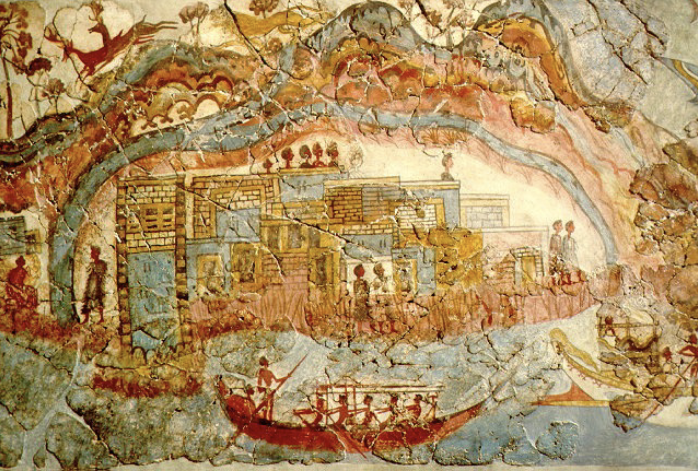
North wall frieze, from west house, akrotiri, 1650BCE
In the same room where the Flotilla was, this Fresco was located as well, depicting people falling off the ship(they're being casted over board). *This depicts that the Minoan civilization was not as peaceful as one though, there was always the threat of war, raiding parties.
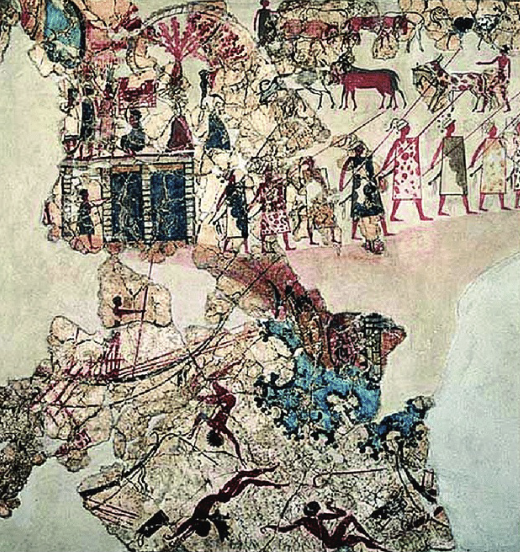
Boar Hunt Fresco, Tiryns, 13th century BCE
Fresco in Mycenaean palace depicts violence through the bull hunt. Represents Sshift toward a slightly more competitive culture . and how they were not just peaches and daises
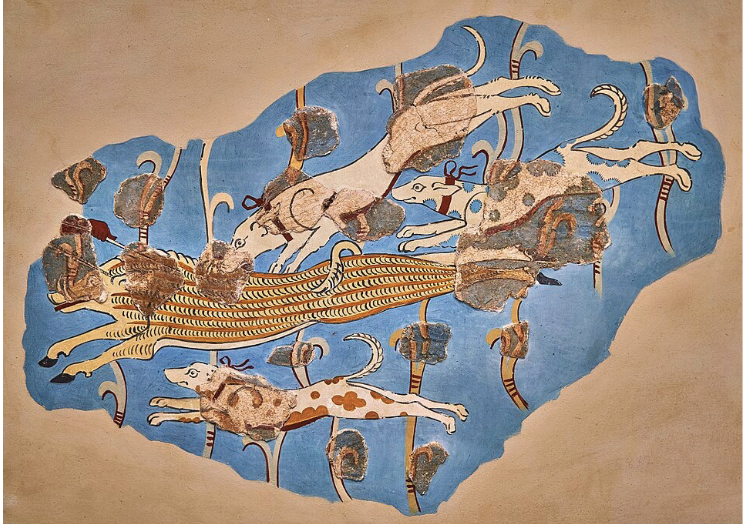
Mycenean soldiers on the warrior vase, 1200 BCE
shows Mycenaean warriors (first depiction of people in pottery) / Greek soldiers.
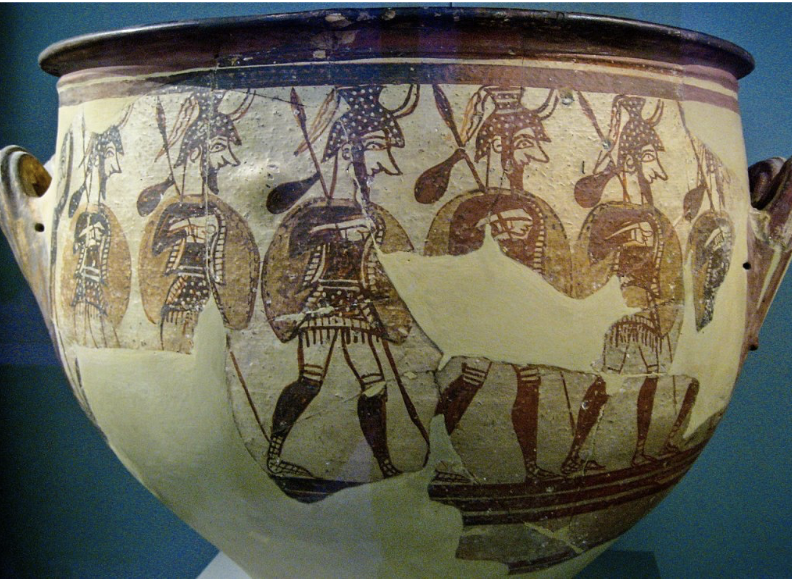
Mycenean gold leaf breastplate, in imitation of bronze at royal shaft grave at Mycenae, 1500BCE
Mycenean Armor in Hittitte art
confirms the thesis of Schliemann of archaeological connections from greeks of mycenae and experience of the greeks of the cultures in charge of the area of Troy (Hittitte)
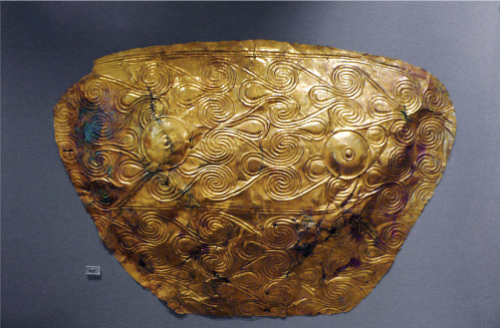
Mycenean armor depicted on mycenean warror inscribed on a Hittitte clay vessil, 1350 BCE, Bogazkoy
is preserving the Mycenaean / Greek warrior with the same hat and swirls from the breastplate, in the Hittite world confirms interaction between cultures
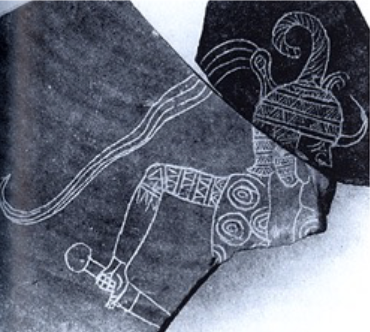
Lions gate Mycenea
The huge thick walls and entrance projects power and speaks to a culture aware of the possibility of danger. The lion symbolizes a deity ,power and imperial majesty. It's a clear marker of status, authority, political, military and religious centrality the site holds in the area.
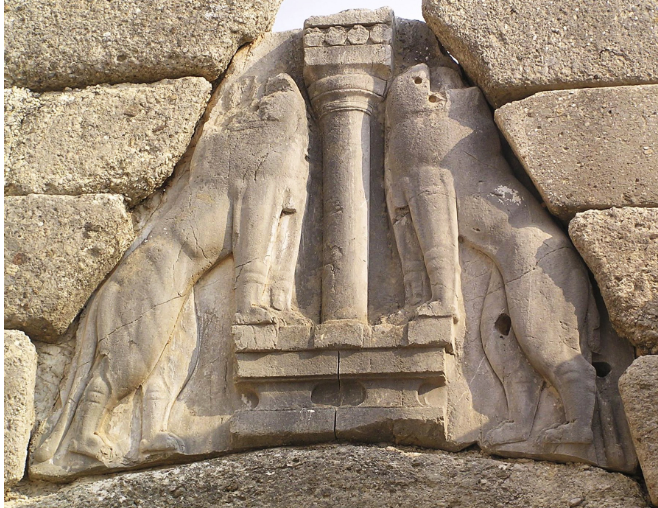
Treasury of atreus, tholos tomb, 1250bce, mycenea
Elaborate structure that testifies to the wealth of the Mycenaean community, and their honering of fallen chiefdoms.
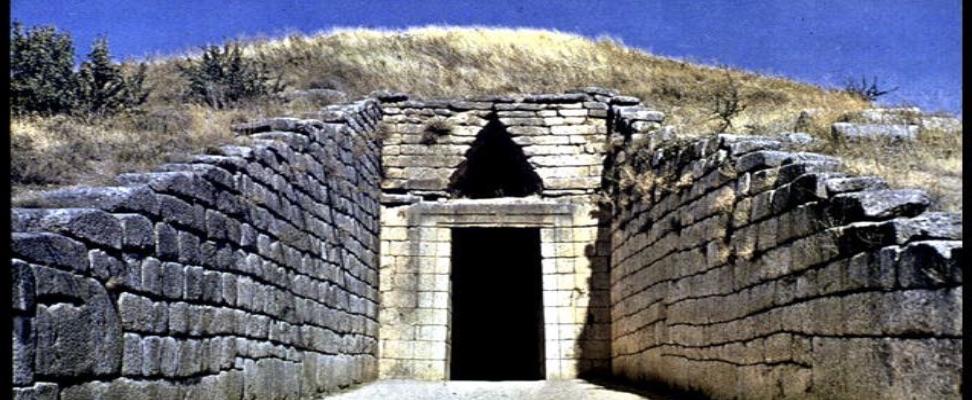
cup from mycenea, 1500BCE
Found inside the shaft grave sites even before the palace was built. There was always that wealth. Sometimes called Nestors cup (right), the left looks similar to the swirl pattern of the breastplate. Symbolize powerful and wealthy culture as they're able to just bury them in their grave sites to honor those who have died.
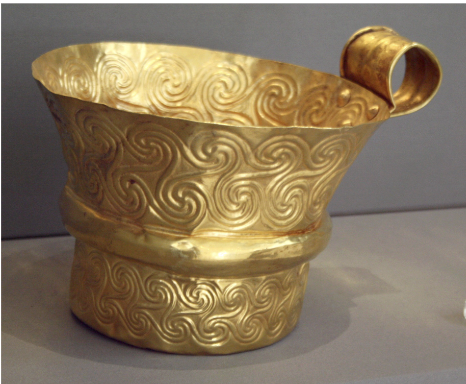
cup from mycenea, 1500BCE
Found inside the shaft grave sites even before the palace was built. There was always that wealth. Sometimes called Nestors cup (right), the left looks similar to the swirl pattern of the breastplate. Symbolize powerful and wealthy culture as they're able to just bury them in their grave sites to honor those who have died.
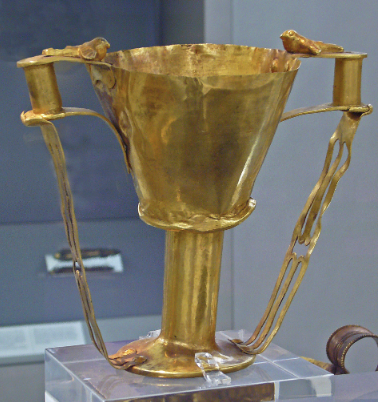
lion hunt dagger from shaft grave IV, Mycenea, 1500BCE
evokes earlier Meopotamian rulers, it is found in the early graves depicting Mycenaean warriors with shields/ organized warriors. Hunting is something that marks them as heroic when not fighting in a battle.

Linear B- Deciphering by michael ventris in 1952, building off of alice kober
Looks similar to Linear A in Crete but it's different , adapted from experience of looking at Linear A (lost Minoan language), used to record inventory of bureaucracy: gives us insights about how they organized themselves politically and what Myceneans valued.
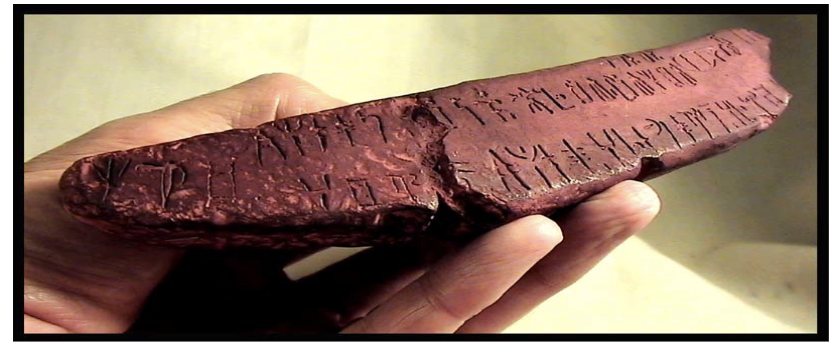
warrior fresco, pylos, 1250bce reconstruction by piet de jong
more signs of battle of the warrior culture of Greeks and rulers in Pylos and Mycenae (although no depictions of them) (unlike Crete), no depiction of sweet nature like the dolphin scene. See greeks with helmets benign the one who stab
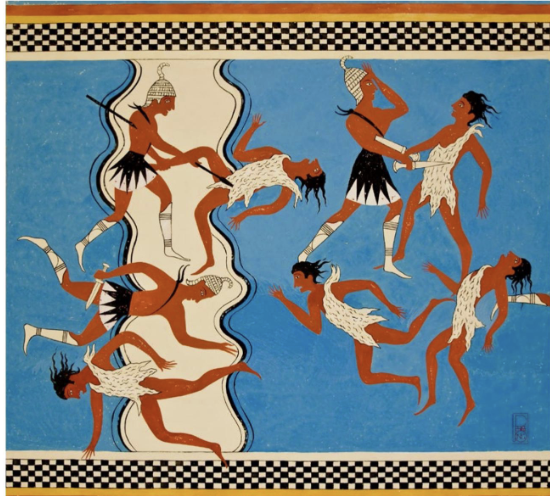
pendents made of gold, lapis lazuli, and glass, depict egyptian goddess hathor, palace of nestor at pylos, 1400 BCE
Jewels of warrior prince, delicate jewelry depicting great wealth of the Palace of Nestor
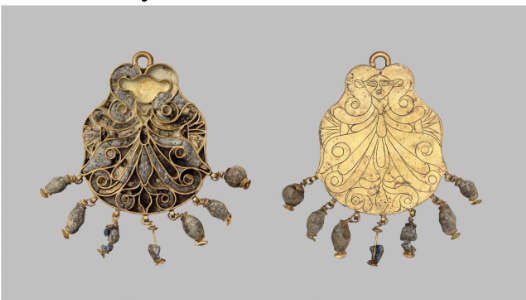
Tomb of the griffen warrior, gold ring depicting bull leaping 1450BCE
extraordinary craftsmanship, representing overall,highly advanced, highly developed, highly connected war like culture.
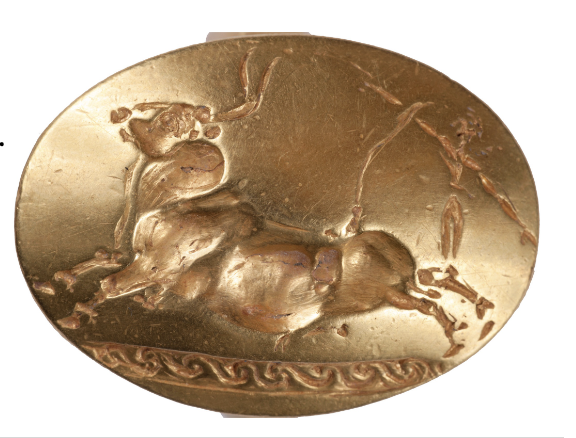
Tomb of the griffen warrior, gold ring depicting women before a shrine 1450 BCE
: depict female sacrifice and represent overall,highly advanced, highly developed, highly connected war like culture.
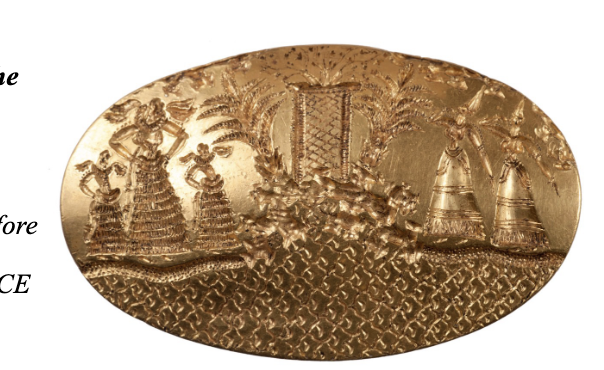
Tomb of the griffen warrior agate stone from pylos depicting a man looming over the lion 1440BCE
man over war, represents overall,highly advanced, highly developed, highly connected war like culture.
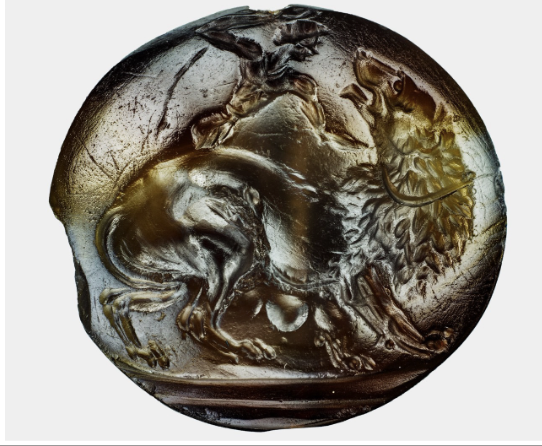
Protogeometric Amphora from the Ceramicus cemetery in Athens, 950BCE
for olive oil, pottery evolved and the pots sspread across large parts of the world during the change from Bronze to Iron, Although some people call the time after the Myceaneans the Dark age, others call it the Pro-geometric age based on the pots
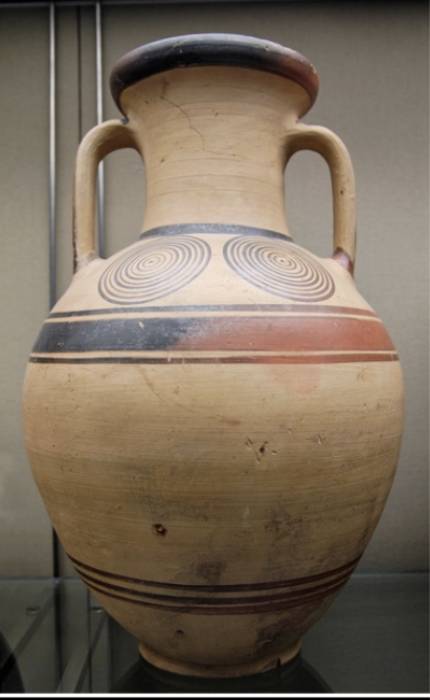
The sea peoples Peleset Prisioners at ramses 111 temple in egypt
The fallen of the Mycenaean people depicted as prisoners. signs of greeks involved in destruction even though greek cities themselves were destroyed as they thought it could have been possible the external forces of Sea people that attacked them and burn down their palaces could have been partly Mycenaean Greeks as troy was destroyed during that time
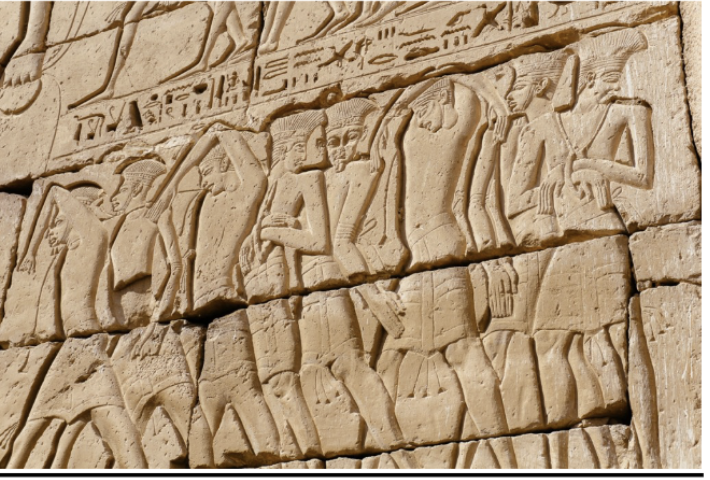
Nichoria Cheiftans house 1050BCE
Nichoria was part of the Pylos Network,after 150 years of Pylos being destroyed the rebuilding, its not as grand as the palace but it speaks to some emergent set of organization. Circle area: some kind of religious and political center for the ruler of the community, As id greeks go back to the earlier form of organization
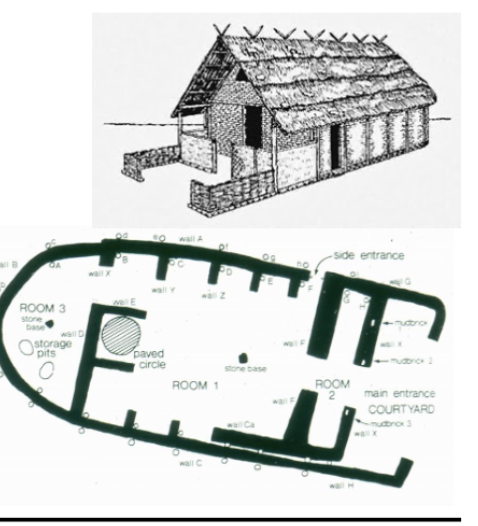
Lefkandi Heroon 975 BCE
:Its a site in Euboea with the continuing integration of that part of the greek world with the broader trading network in the east such as the Phynicians. The building is a larger version of a chiefdoms house, it has a burial in the ground- in 1 there are 4 horses bruised as offering and in the other one there is a bronze earn of the ashes of some warrior or king, next to the earn there is iron swords, wheatstone, daggers= symbol of important warrior or king. Next to the bronze earn there is a skeleton of a woman in an elaborate golden hairdress and jewels that come around the Greek world.
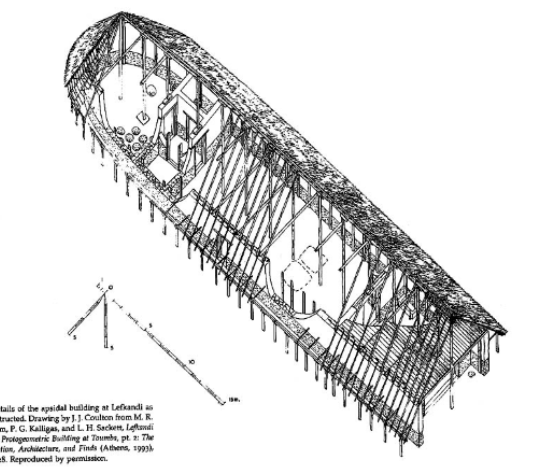
Lefkandi Centaur found in the grave site at lefkandi 900BCE
:extraordinary worlds of art that circulate wealth and are put in burials as offerings . symbolize Euboeans dark age doesn't last long
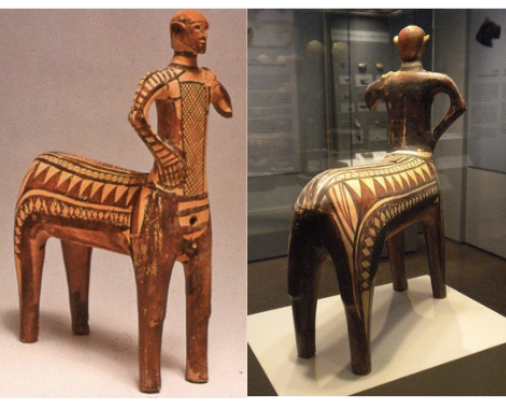
:Nestor’s Cup - Found at Pithekoussai in Italy 720 BCE
first example of the new greek alphabet that they adopted from the Phoenicians, Linear B is lost. First phonetic alphabet and first form of writing form it . Found in trading site of Eoboian ,evoked the homeric past, it’s about getting drunk- it links together all culture, homer, Euboeans and Oheoneicias
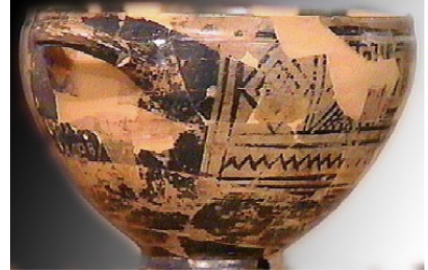
Nestor’s Cup - Found at Pithekoussai in Italy 720 BCE
first example of the new greek alphabet that they adopted from the Phoenicians, Linear B is lost. First phonetic alphabet and first form of writing form it . Found in trading site of Eoboian ,evoked the homeric past, it’s about getting drunk- it links together all culture, homer, Euboeans and Oheoneicias
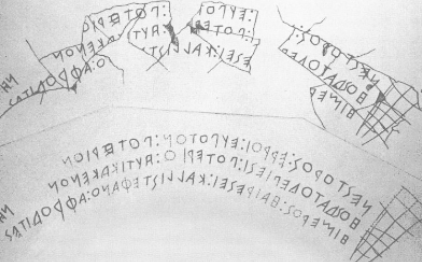
The Blinding of the Cyclops Sperlonga Museum of Archaeology. Italy
: this is the portrayal of Odysseus blinding the Cyclops Polyphemus ,son of Poseidon where through such angers the Cyclops asks Poseidon to never allow Odysseus to get home. This specific moment is what shaped the trajectory of his story
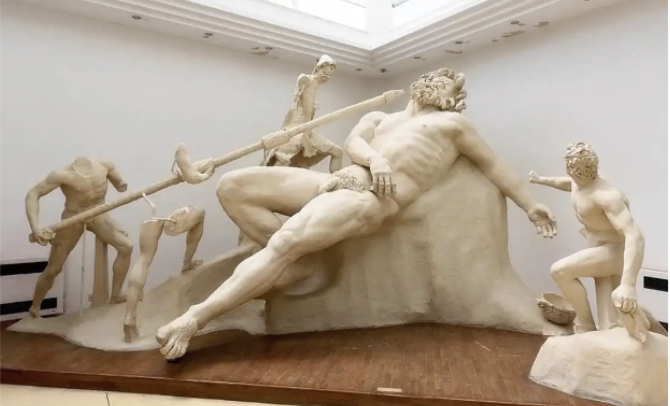
Lucanian Red-Figure Calyx-Crater (Odysseus summoning the shades) 390BCE.
: having slaughtered the animals dropping the blood down so spirits talk to him (In Hades). What he discovers from the spirits defines some of the normative values of the Odyssey: what’s the role of the women, what's the role of the hero.
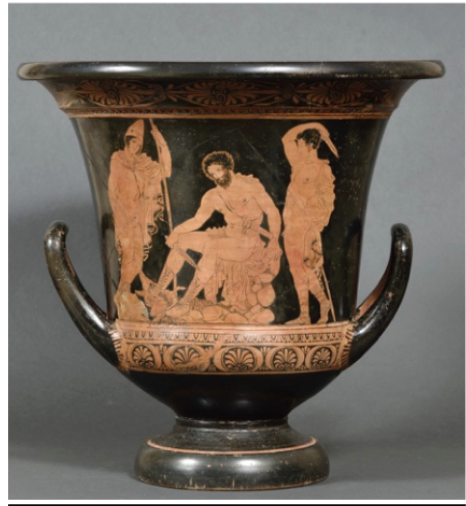
Tablet with instructions for the deceased in the Underworld. 300BCE
:layers, various versions of the death. People were buried with these tablets and they contained a series of instructions of what to do with them when they're dead - concern of the underworld and where you go. Importance in burial to not get stuck on the border due to improper burial.
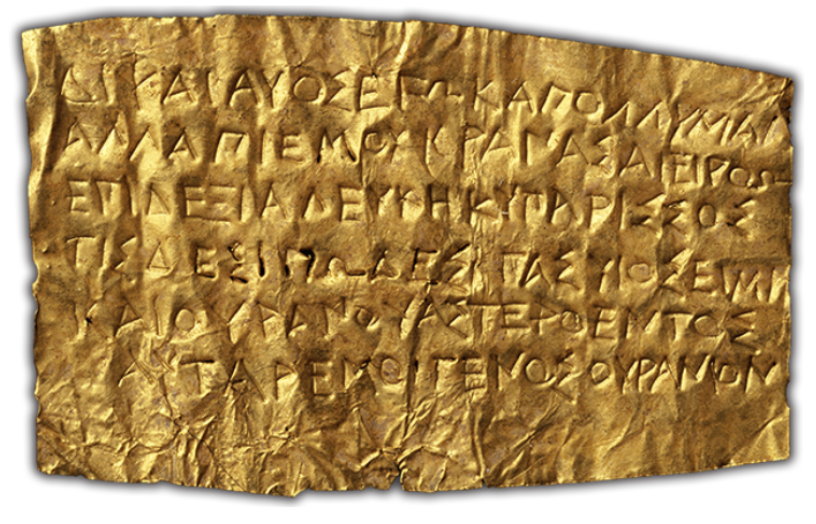
: Siren Vase: Detail of RedFigure Stamnos. British Museum, London
Date: 480BCE.
Here we see Odysseus tied by his crew going through the sirens.theme of leaving humans adrift from their homes, forgetting home is one of the largest fears. Offer to forget troubles and forget home
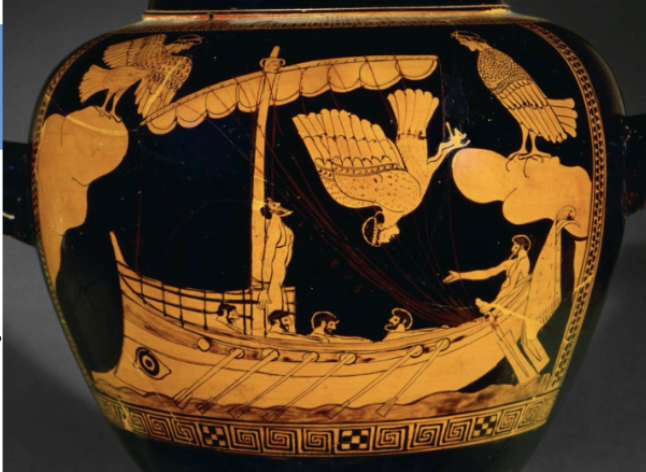
Athena born from the head of Zeus, with Eileithyia (goddess of childbirth).Black-figured amphora. In Louvre Museum, Paris :550BCE
: it's the symbol of Zeus being above all, Zeus is incorporating female production . Zeus swallows the power of production and controls the production himself- just children that are loyal to him like Athena and that wont overthrow/ overpower him.
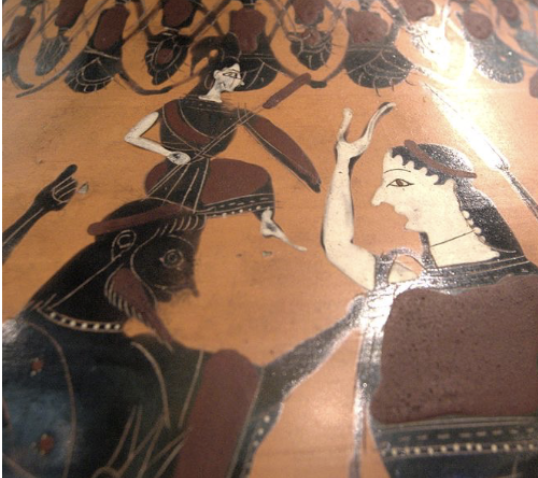
:Black Figure Kylix showing Eris (=Strife) Early 6th century BCE
:inside of the cup showing strife, Eris, there's the bad strife that causes war and famine, but also a good strife that might be called rivalry, the competitive spirit (involves anger)and is good for mortals. An entrepreneurial go- marks shift form the Theogony
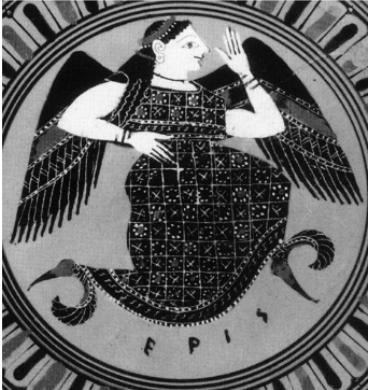
:The Development of Pan-Hellenic Games Early Olympia – Western Peloponnesian Rural Cult
animal figurines dedicated at Olympia, this is evidence of cult activity going back to the 12th century. Earlier farms, perhaps agricultural festival, charioteer, early modeling of Zeus and Hera horse. The increase in figurines- mass increase of people visiting the site. Repurposed in the 8th century into a borade Pan Hellenic site ( a holy space)
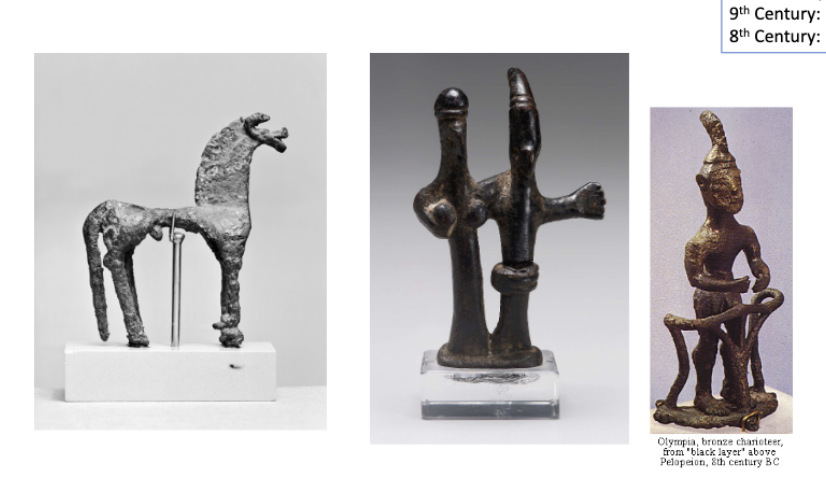
West Pediment - Lapiths and Centaurs
Battle between lapids and Centeurs= this battle became a codeword between the battle of monsters and civilization/ represents triumph of civilization
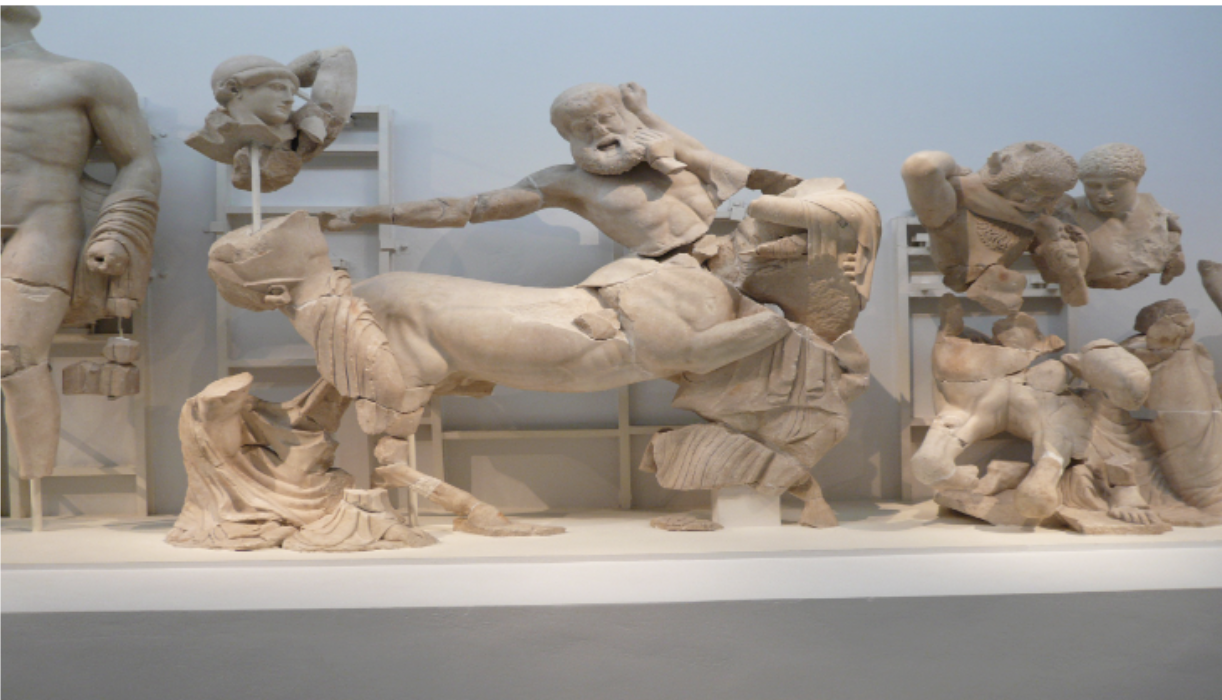
:East Pediment - Zeus, Pelops and Oinomaos
n:contest between pelops and Oilemens: Pelops has been taught to drive a chariot by Poseidon and the easiest way to win is to cheat. Pelops wins the race and Oilemes crashes Story about victory, kingship, marriage, heart and glory of sport. Involved black magic and divine patronage

:Metopes – Heracles Cleaning the Stables of Augeas (King of Elis)
: Story of Hercules labors of cleaning out the Stables of Augeas- to do so she diverted the courses of the rivers. Auguas doesn't pay him= conflict= leads to series of games set up after the death of Aeuguea: story linked to greek hero
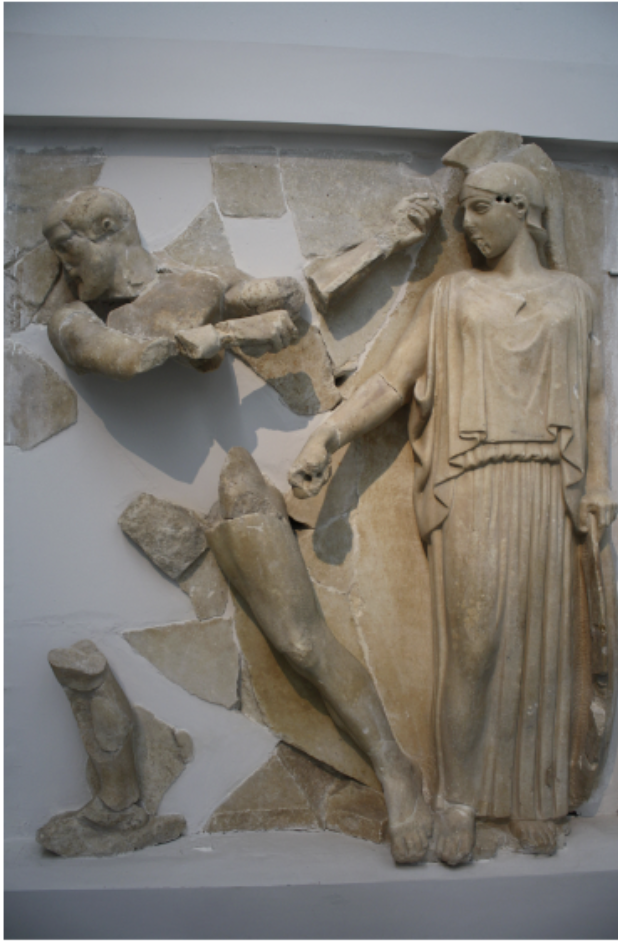
:Rules and Objectivity
:everyone was subject to the same treatment, the one place where it was okay to whip a free individual. Judge is whipping as one of the athletes is yielding
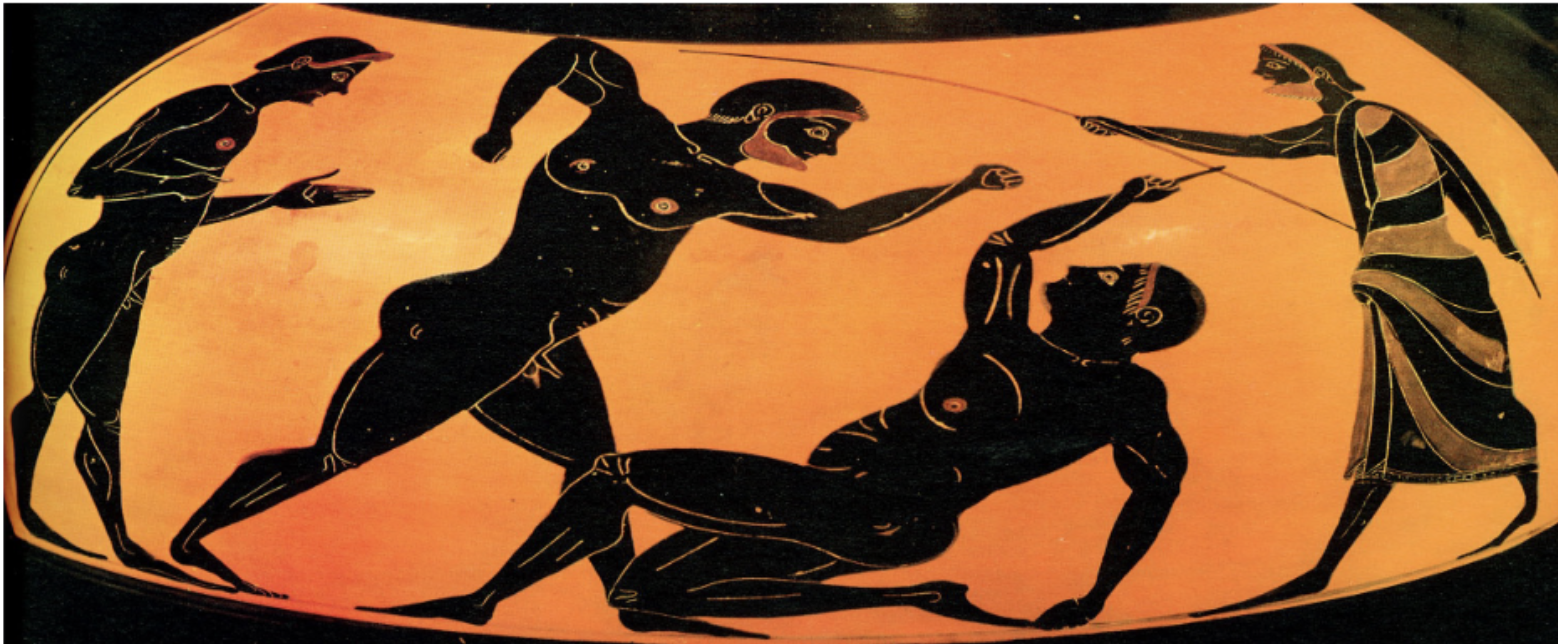
The hysplex and the hoplitodromos
last race where war almost returns to the game they would carry a shield running naked, The lines are the sense of fairness of evaluation, space of competition to share your greekness and winning individual glory
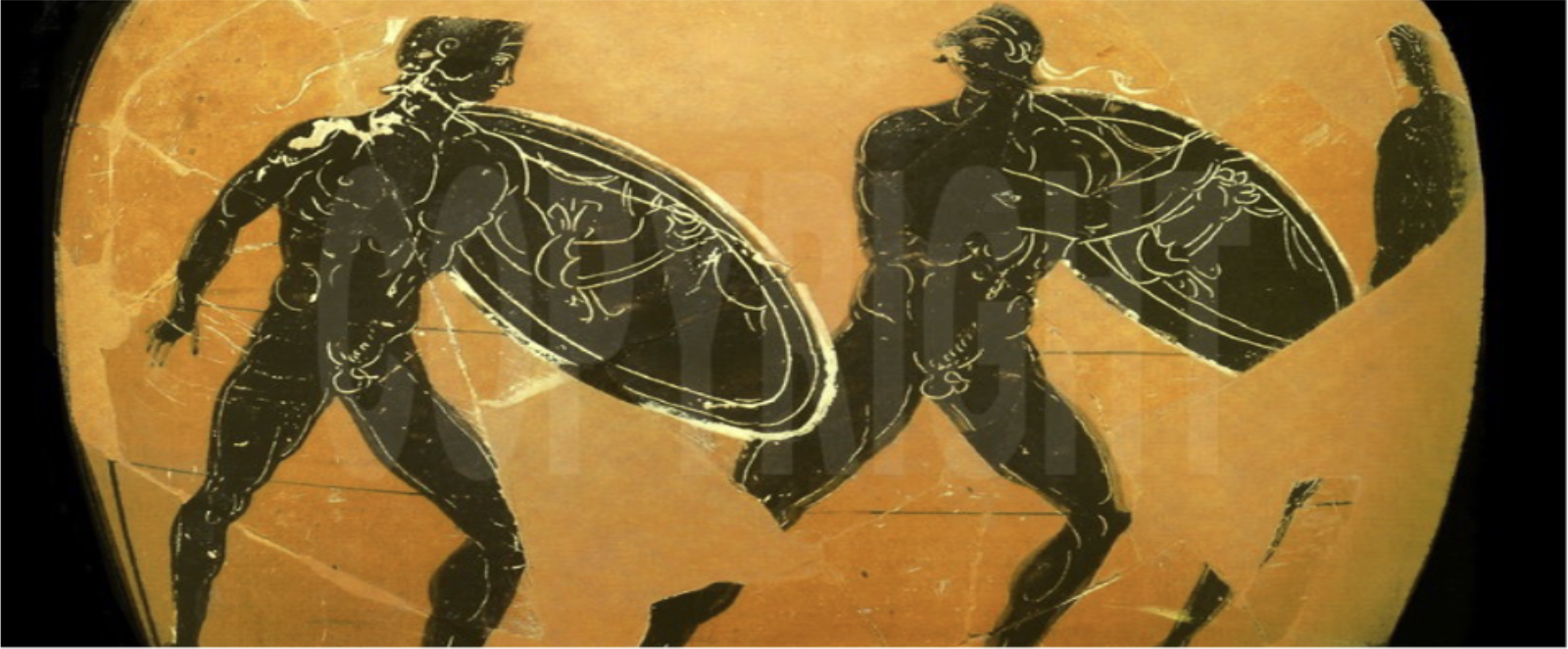
Temple of Apollo at Delphi
the ruins of APollo had to be rebuilt multiple times and each time they asked for gives around the world, each time you gave a gift, the prophecy would fall in your favor
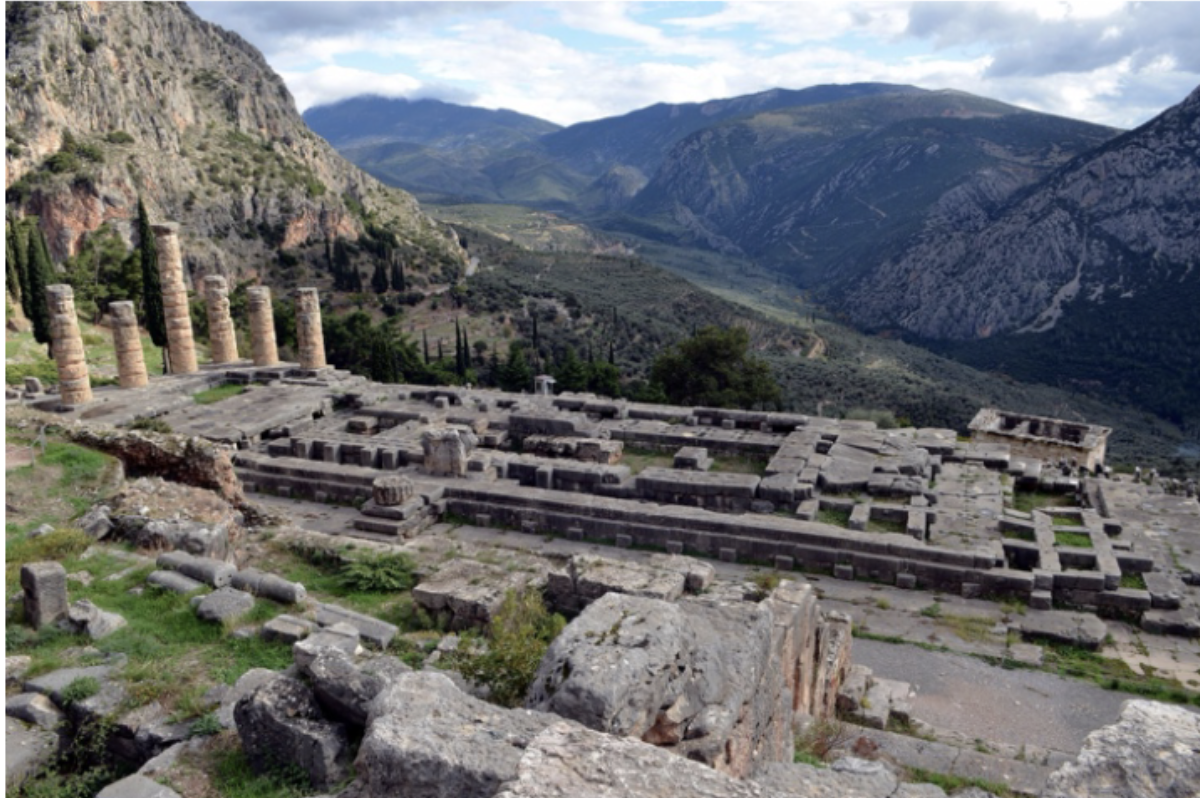
The Omphalos. Marble Late 1st century CE
The center of the world- When Kronoss was fed the stone instead of Zeus, Zeus later when he grew made his father spew up the stone-the stone part of this panhellenic myth is in Delphi ,*Delphi was another kind of center of the world -A wonder for mortal men . Therefore it is a Communication between the divine and the mortal realm
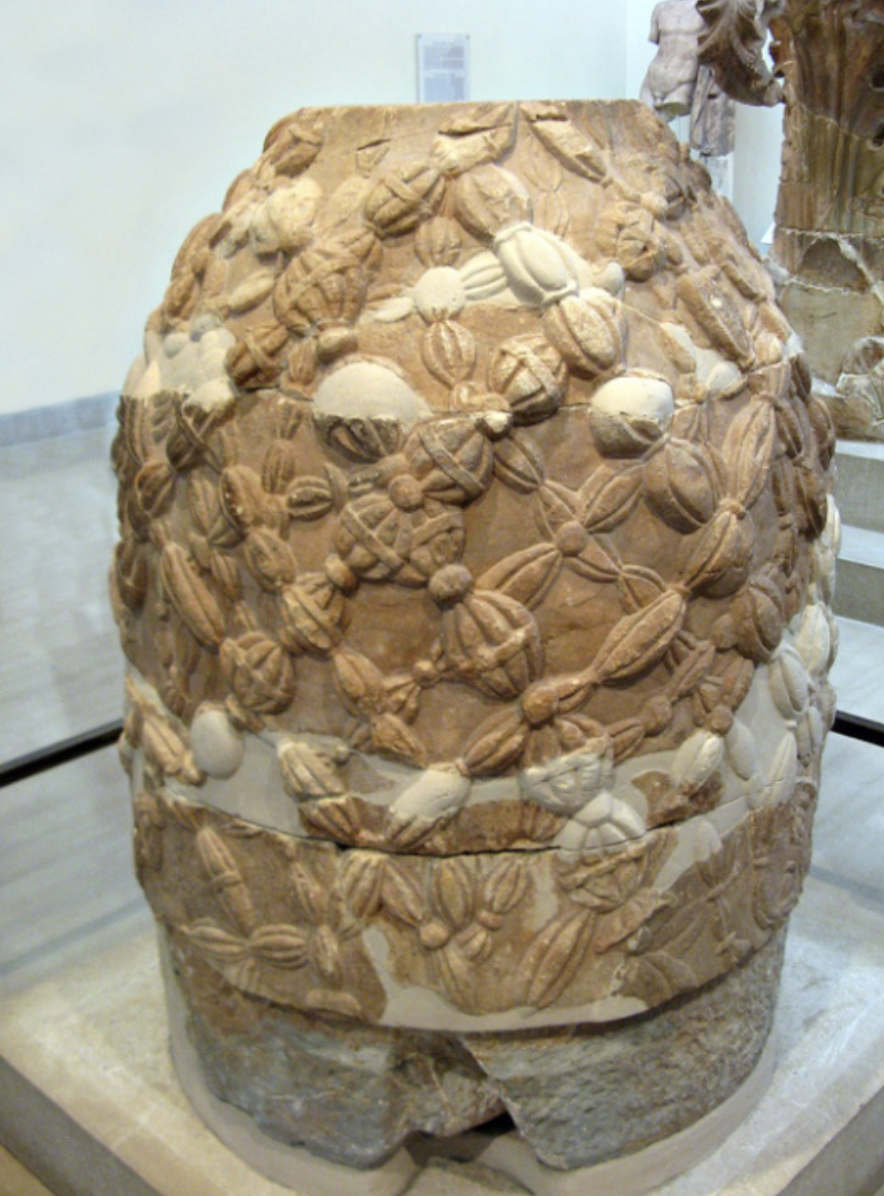
:Late Myceanean Terracotta Female Figurines from the sanctuary of Athena Pronaia at Delphi Date:(12c. BCE)
earlier cult identity, sacred to Athena before Apollo was given the sacred site. The transition from earlier female divine space into a male space: appropriation.
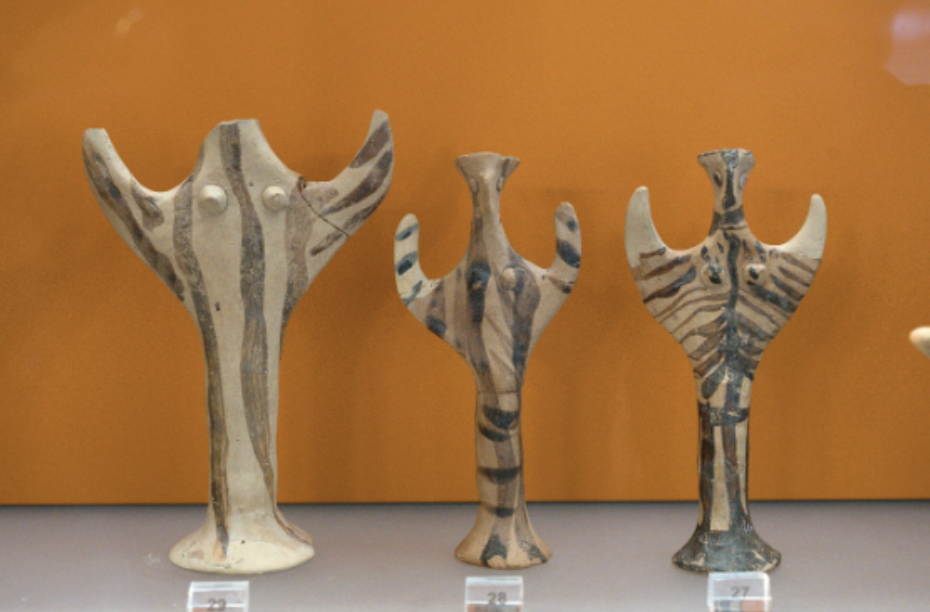
Red figure Kylix by the Kodros painter
t:Aigeus, the mythical king of Athens, seeks an oracle from Themis(female divinity), seated on a tripod in the sanctuary at Delphi.- represents the history of oracle of wisdom before Apollo (womren)
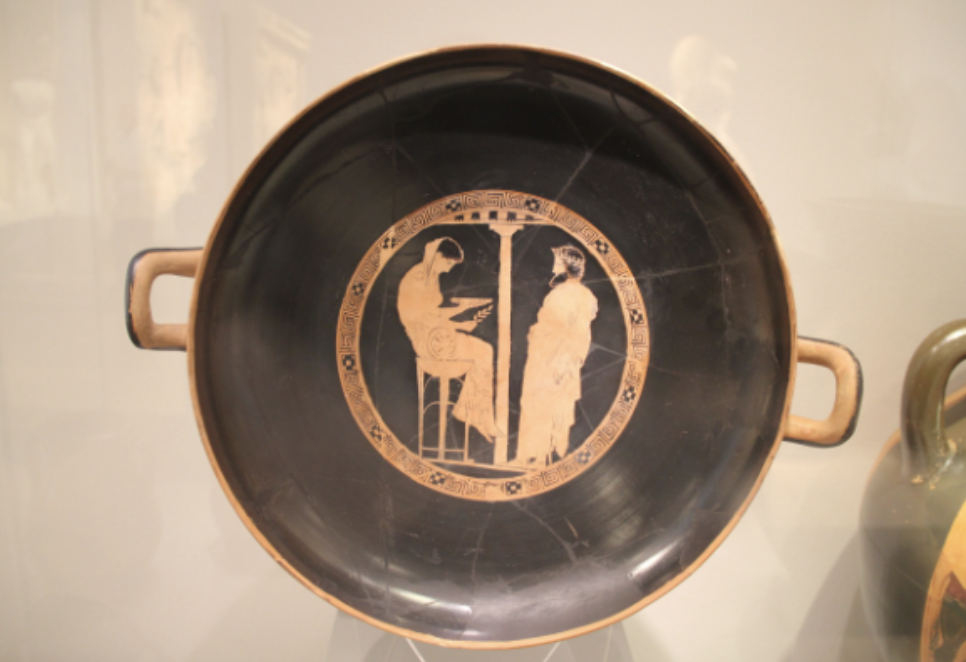
Cult of Apollo Pythios ca. 900BCE, statues
shift in site, cult male dedications that testify to the increasing centrality of Apollo
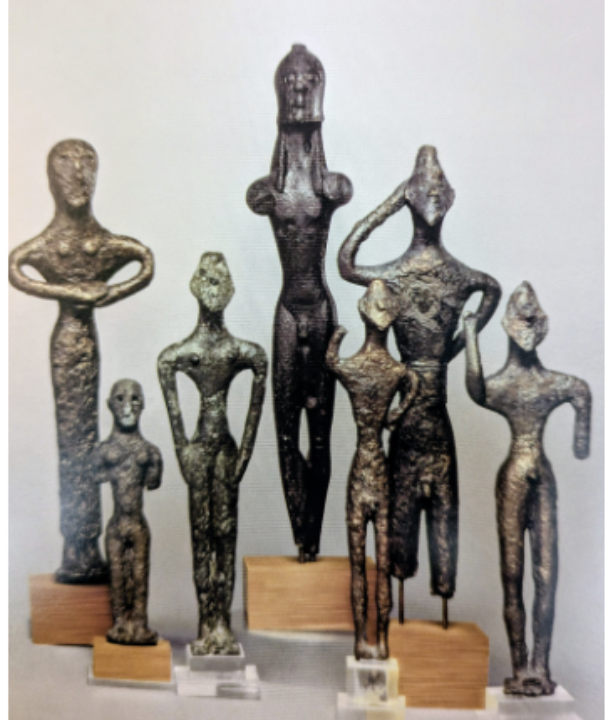
Red figure krater by the Kadmos Painter. Early 4th century BCE
Apollo welcomes Dionysus at Delphi (Dionyses: god of chaos, intoxication of wine), above the omphalos/Apollo: god of light , welcomes gods as well instead of just the shift of female to make . Reporesents 2 modes coexist , site shared with different models of wisdom
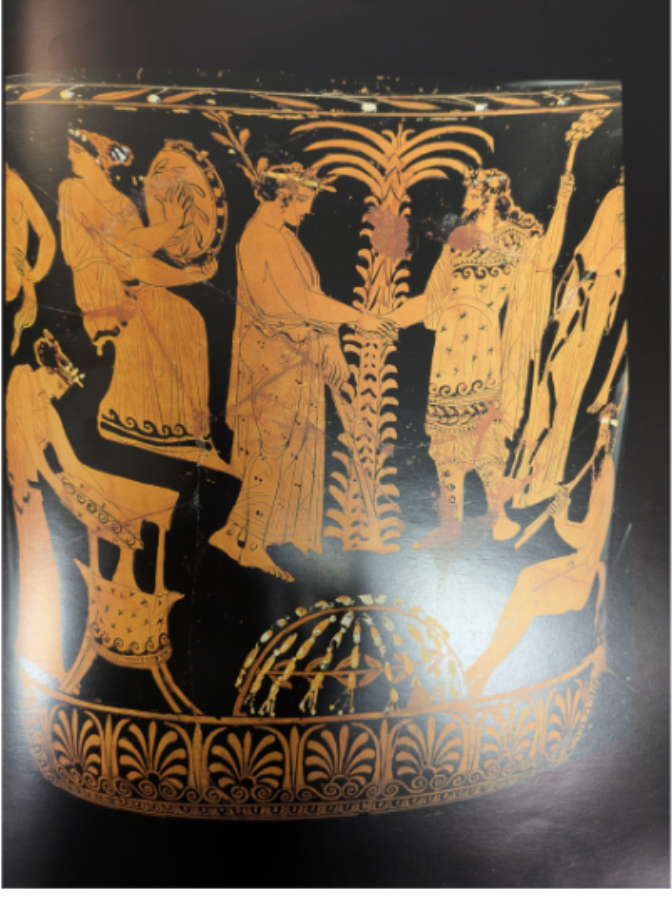
Tholos in the Sanctuary of Athena Pronaia
The whole area is sacred to Athena, where female dedications were found leading to the Mycenian period.
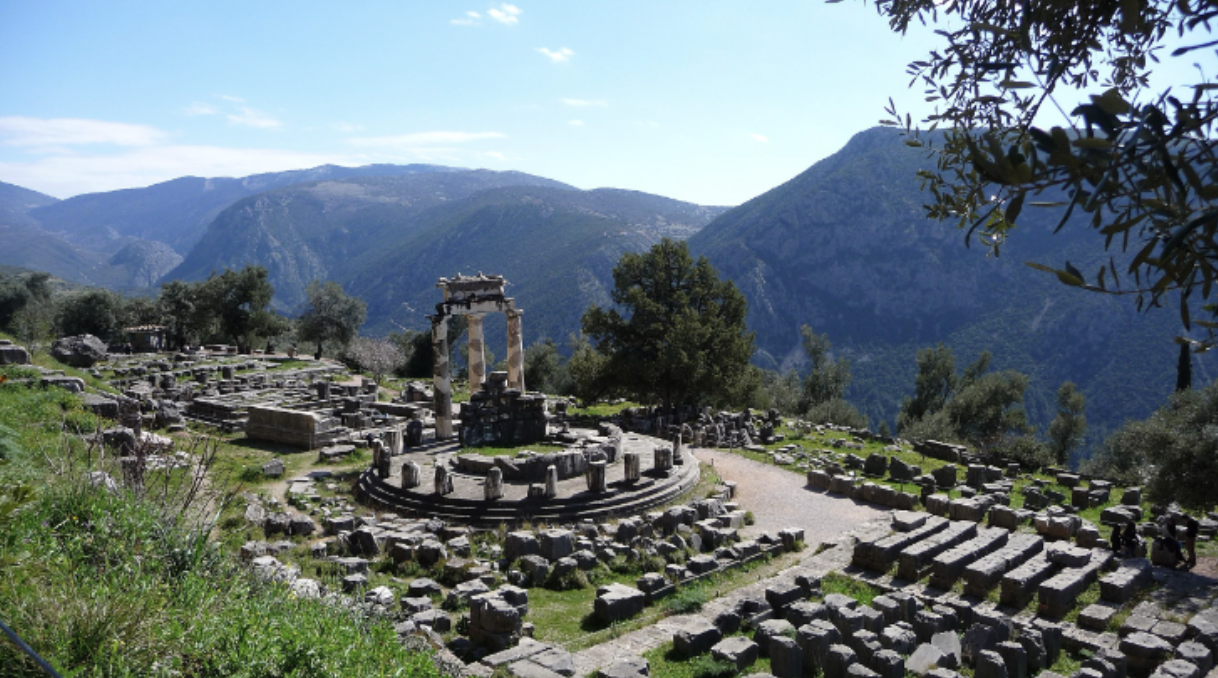
Sphinx of Naxians, originally atop a tall column. Dedicated to Sanctuary
Date:ca. 560BCE.
: gold has a price, you pay it and get the rewards in return. Sphinx created by the Naxions get to jump the cue through honoring the god. Symbolizing the significance of gifts, swap of goods
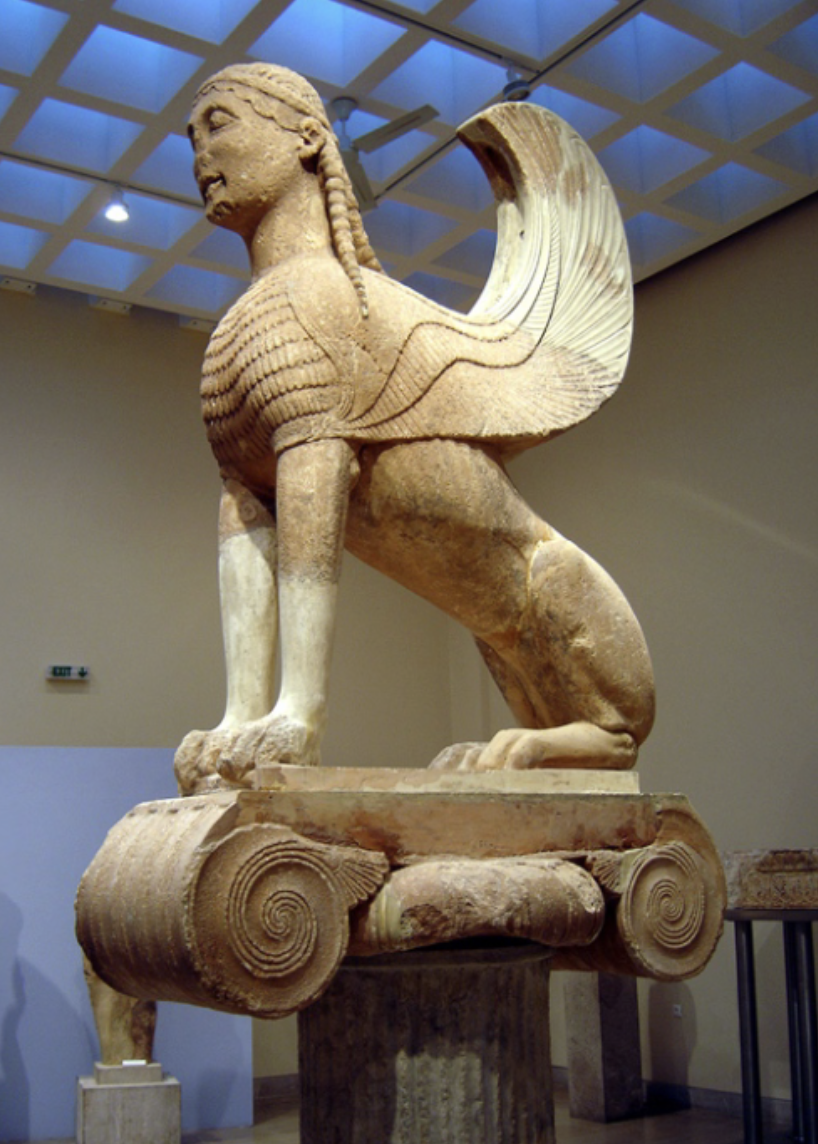
.Athenian Treasury Delphi
The Athenians dedicate a treasury after they helped defeat the Persians, include hymn to Apollo,:Form of wealth on display
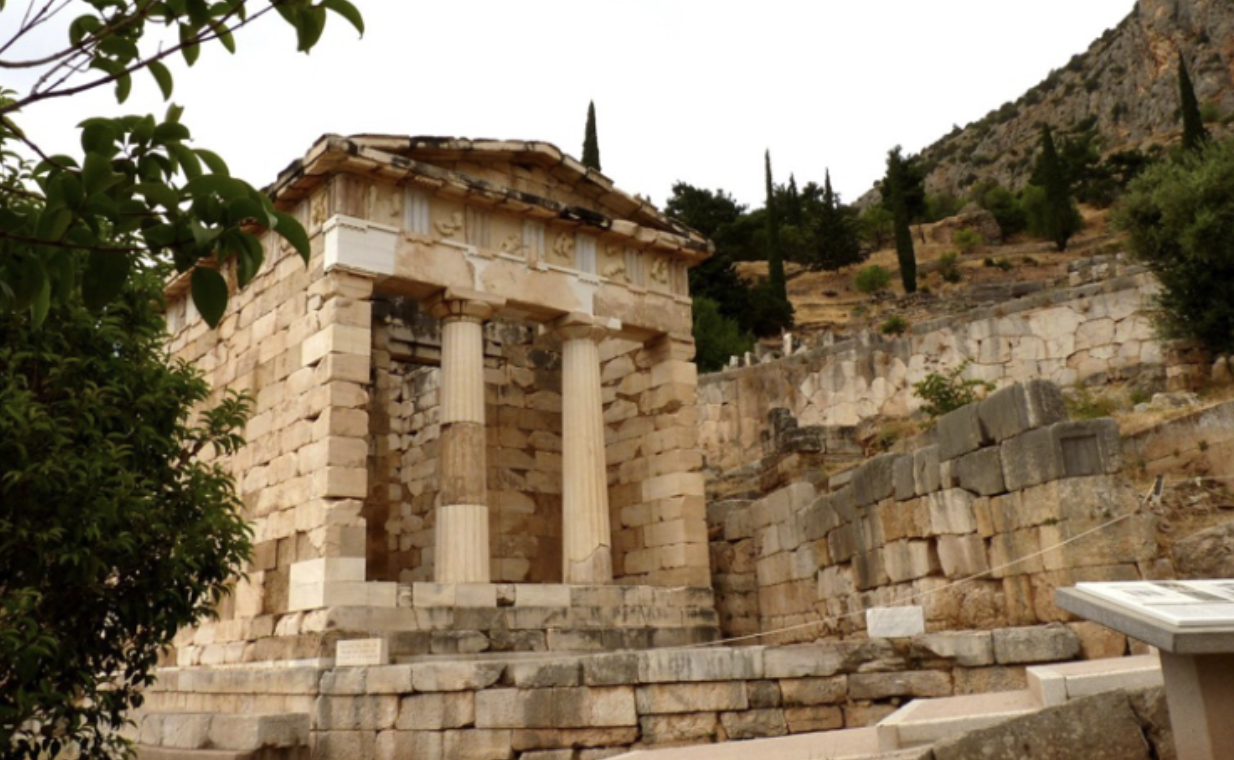
Mousikoi Agones – The Kithara and the Aulos
Someone singing while playing the kithora, a kind of competition we would see, Someone playing the auloss, of athletes from the pentantolon. The person who won the fluit com could play for the pythian athletes. Represents the pythian games
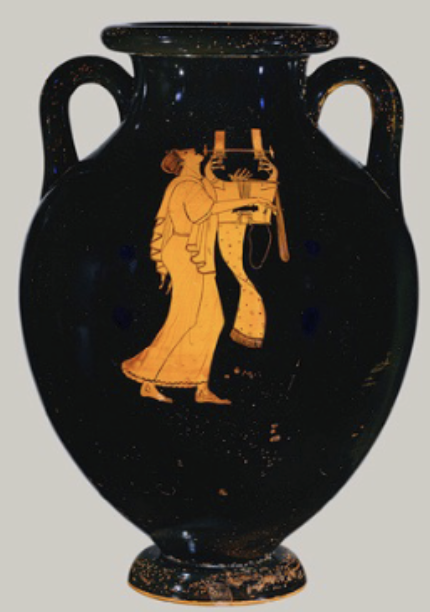
:Mousikoi Agones – The Kithara and the Aulos
Someone singing while playing the kithora, a kind of competition we would see, Someone playing the auloss, of athletes from the pentantolon. The person who won the fluit com could play for the pythian athletes. Represents the pythian games
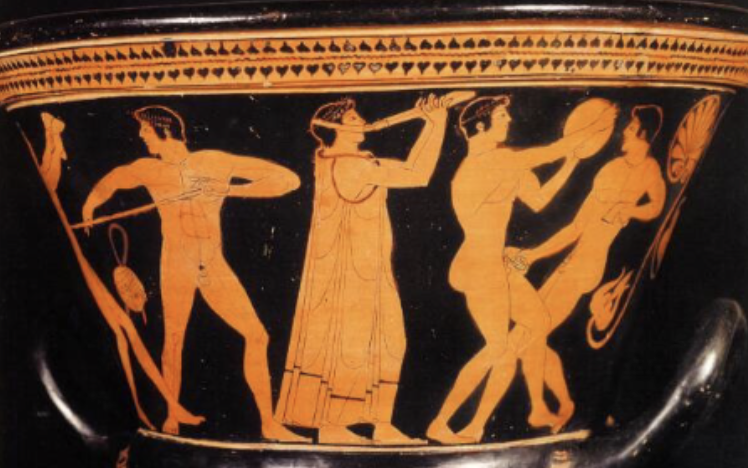
Attic Red Figure Krater.
Date:5th century BCE
:Hermes leads Persephone forth from the underworld to be greeted by Hekate and her mother Demeter. Story of Persophene , raped by Hades add forced agaisnt her will to be hos wife, her uncle,Negotatiaion of ⅓ with hades: durig winter, ⅔ during spring and summer Represents the Story of seasons and how to guarantee the arrival of spring: make a deal with Zeus
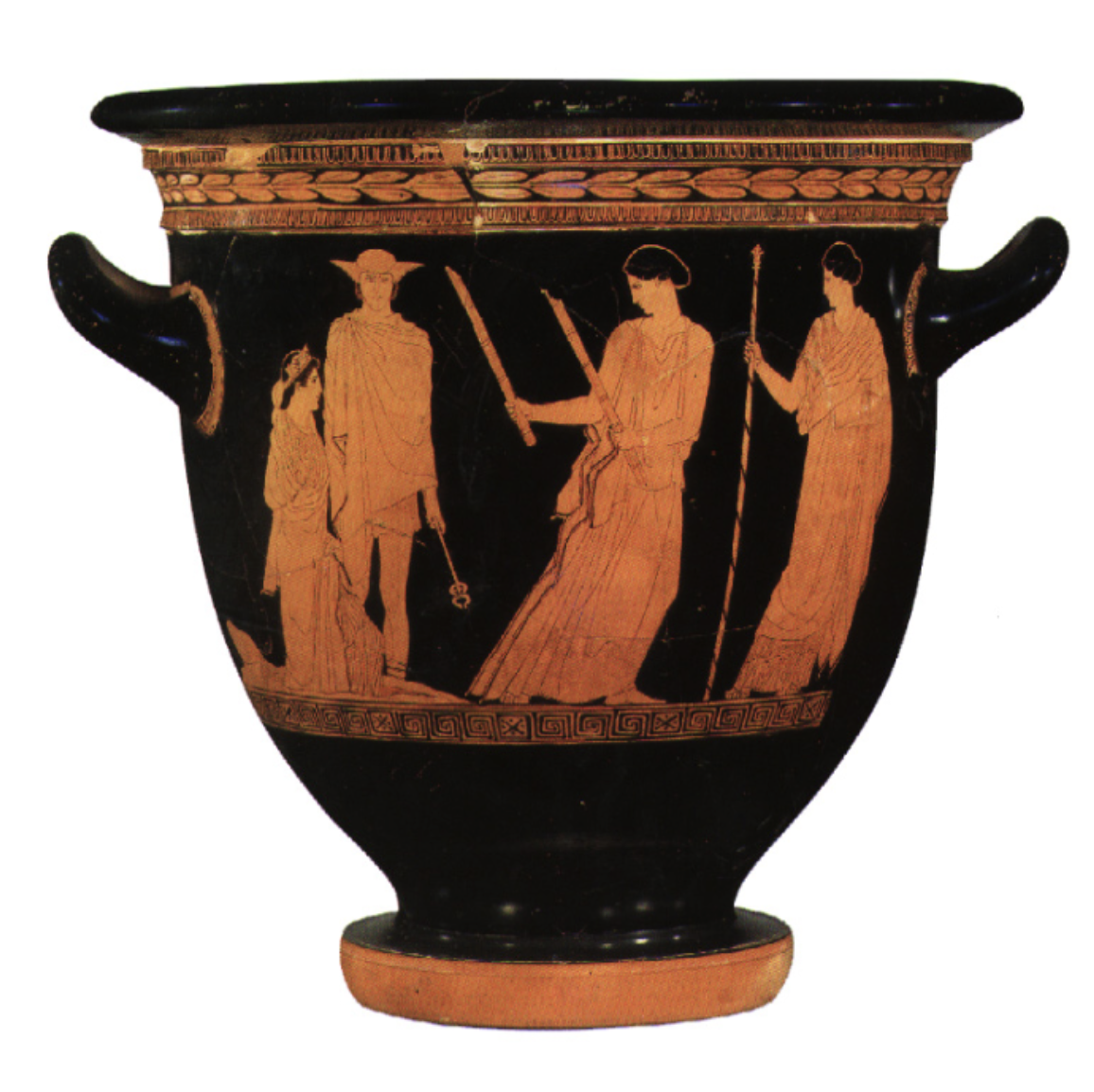
Marble Votive Relief found at Eleusis
Date: 440BCE
Showing (L-R) Demeter, Triptolemos and Persephone
Significance:Relief at Eliuses that shows Demeter, Persephone and Triptolomac (the child Demeter was trying to make immortal)=Linked to agriculture and Linked to how to be immortal, connection to immortality . It also represents the mysteries help you live with immortality in the afterworld, if you transgress the mysteries you don't just miss out, you become punished
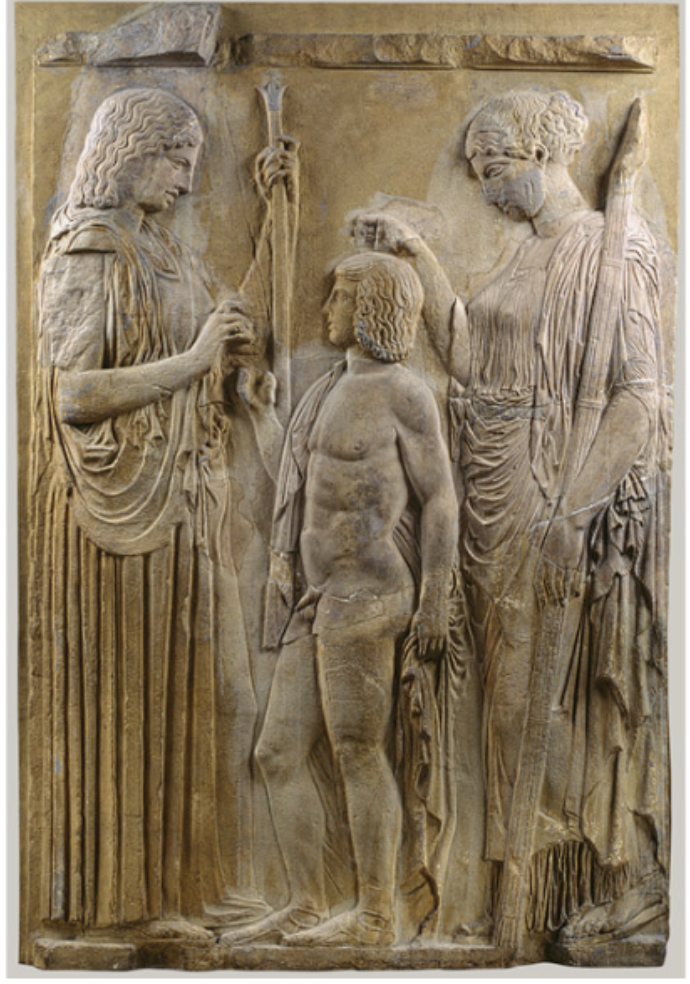
:Marble Pinax of Persephone and Hades found in Sanctuary of Persephone in Locri, Sicily.
Date:Early 5th century BCE
shes married to death in the winter,symbol of fertility(of the crops during spring and summer): as it represents these association is spread throughout the greek world, fertility, sexuality
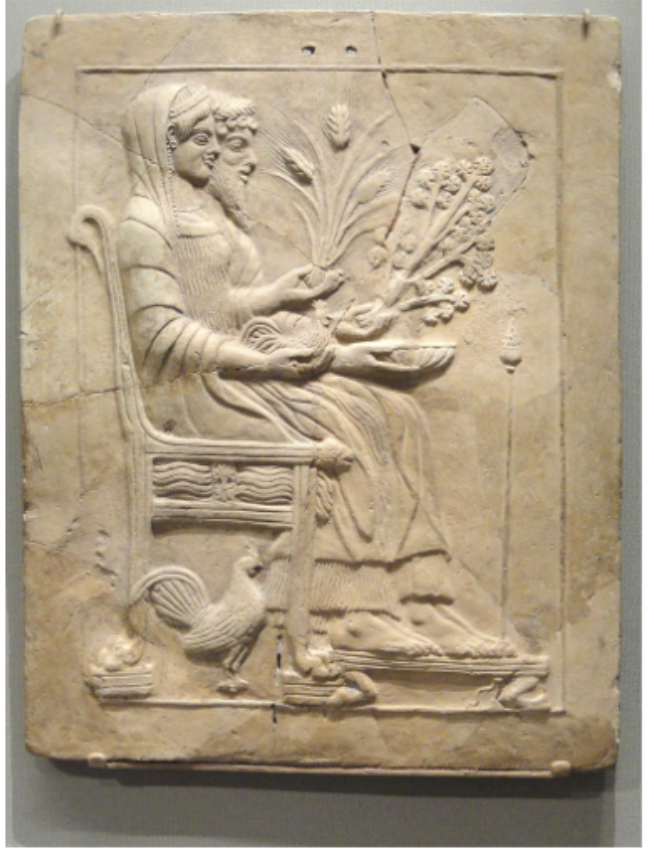
:Ninnion Tablet. Red Clay. Found at Eleusis –
Date:Circa 370BCE.
Only known representa@on of Eleusinian Procession and Initiation/ the only depiction of the Eleusinian procession, depicting Athenian citizens and Torch barriers mimicking the procession( the yearly festival)
